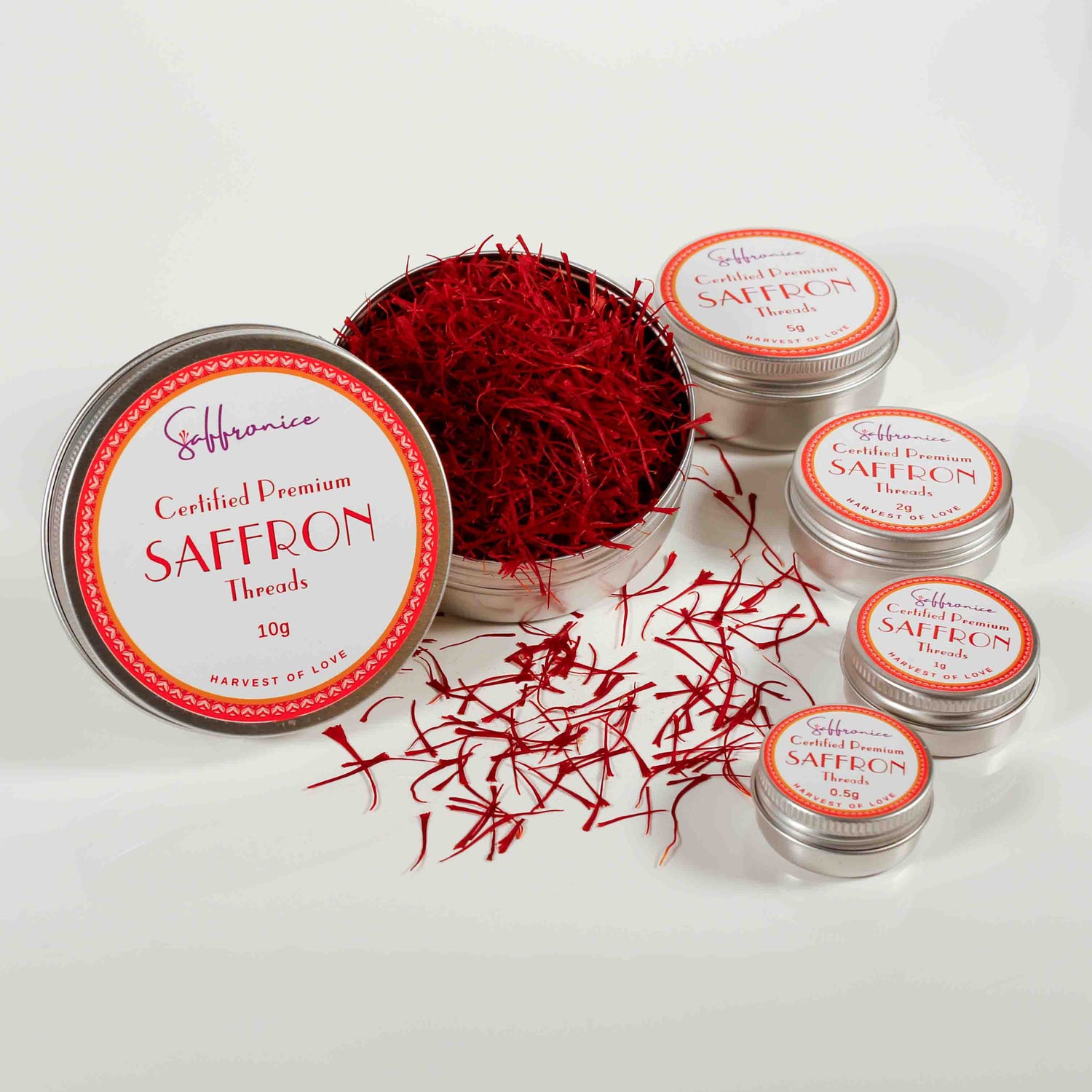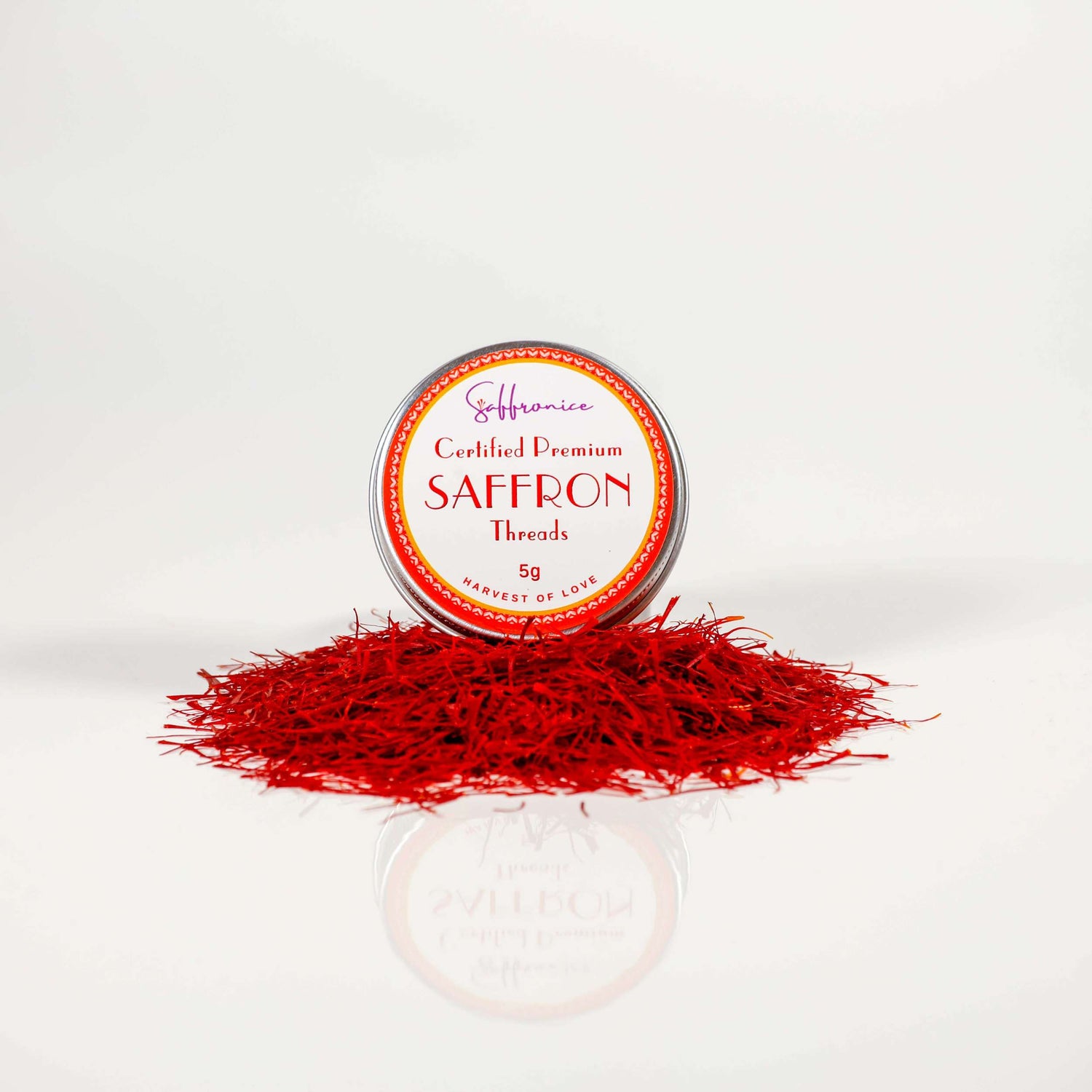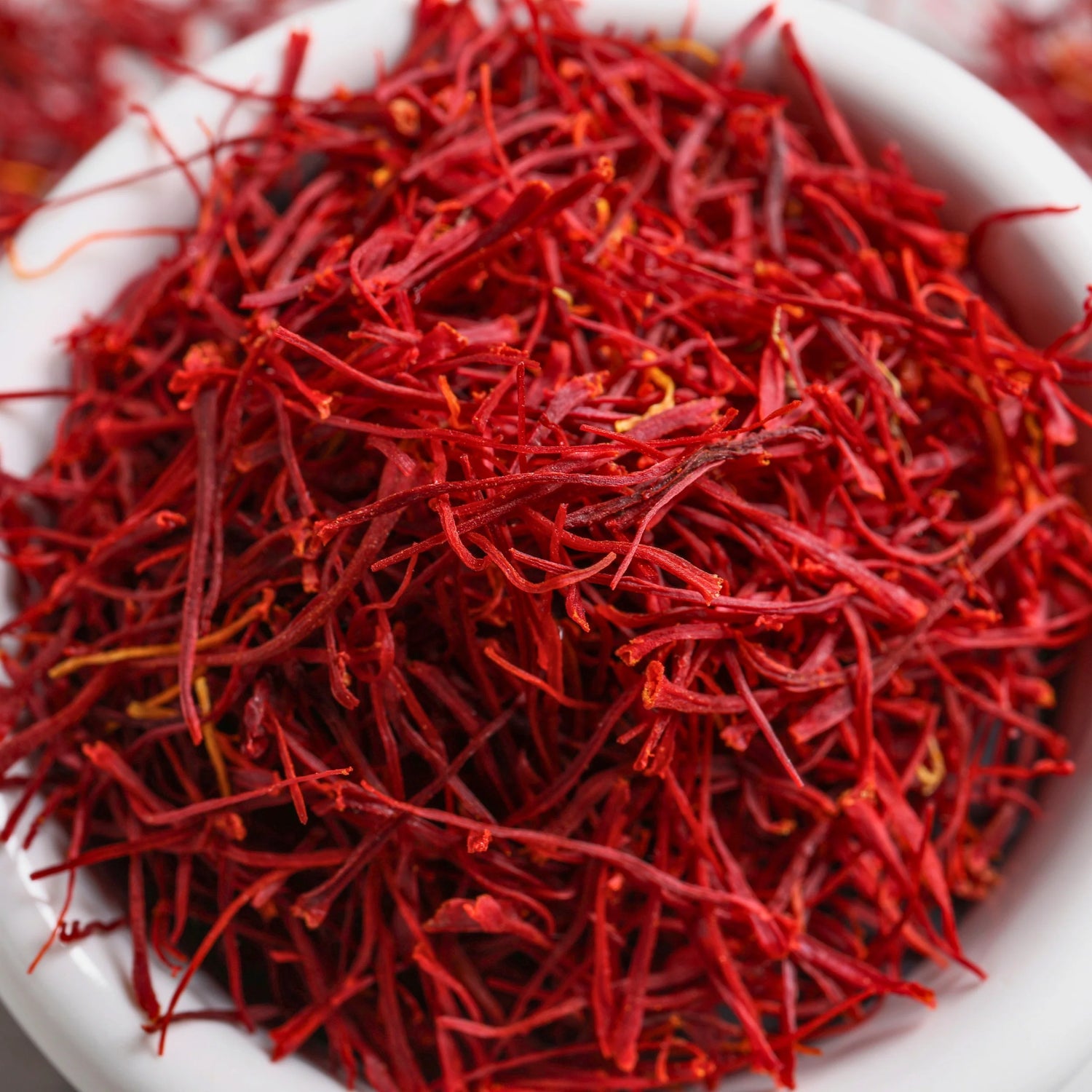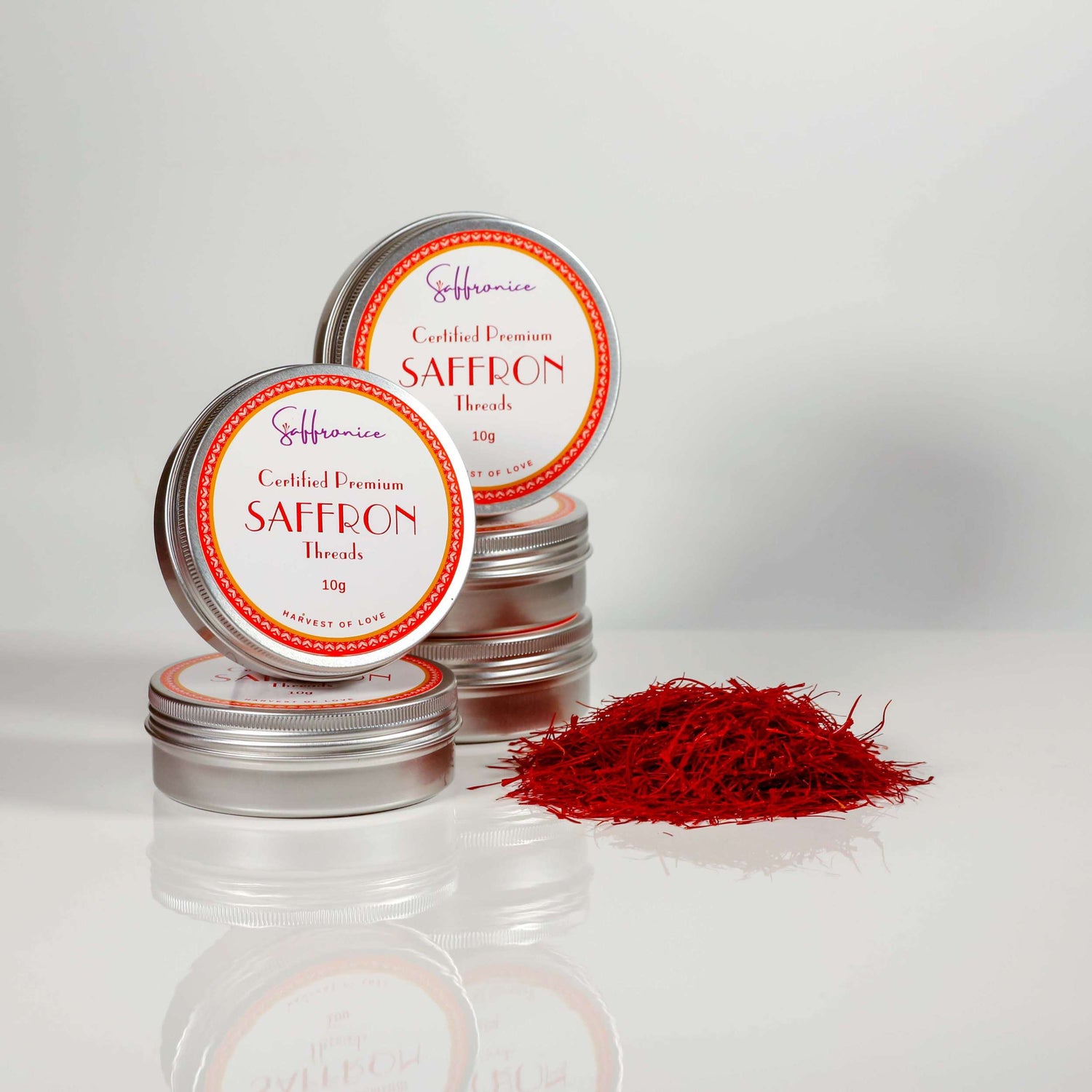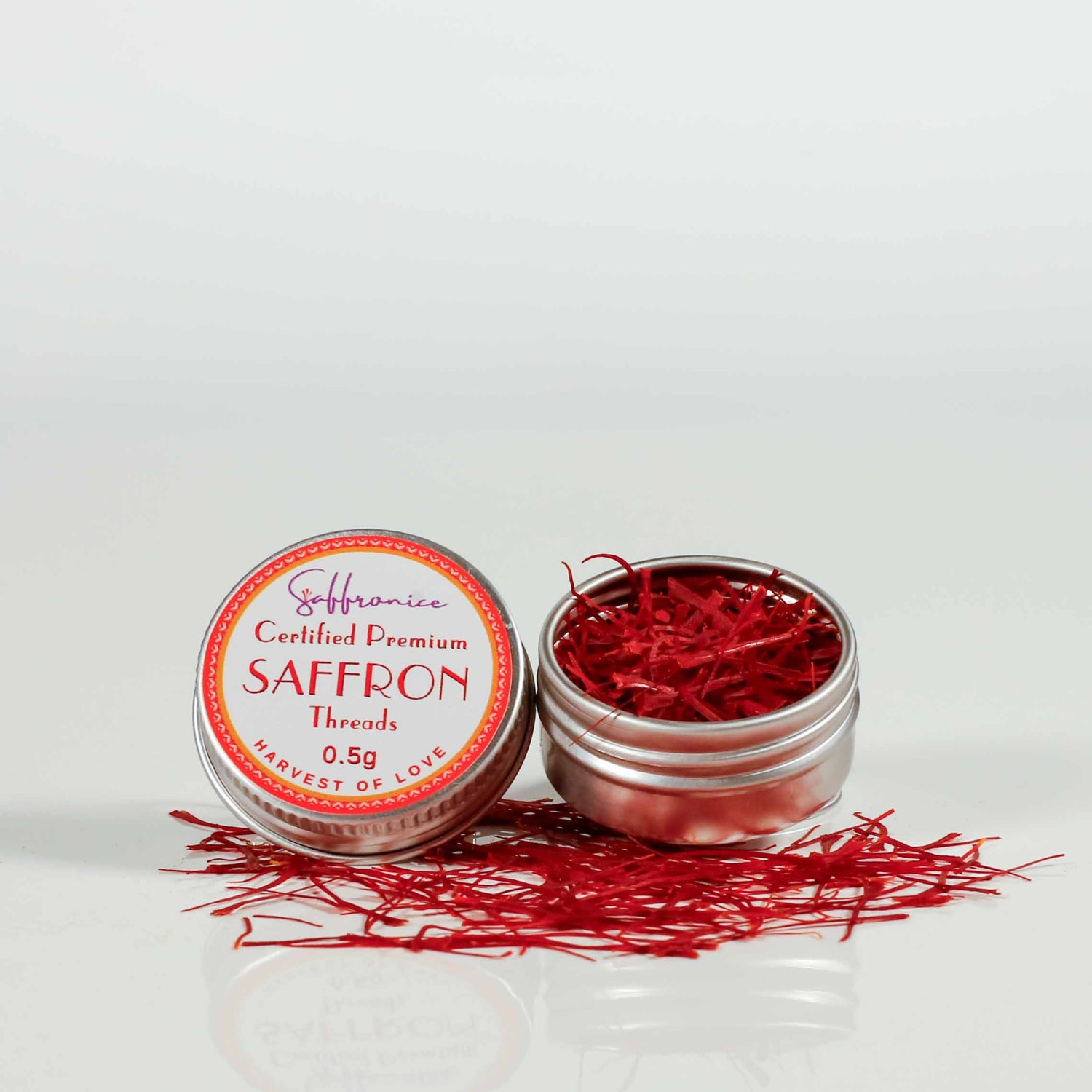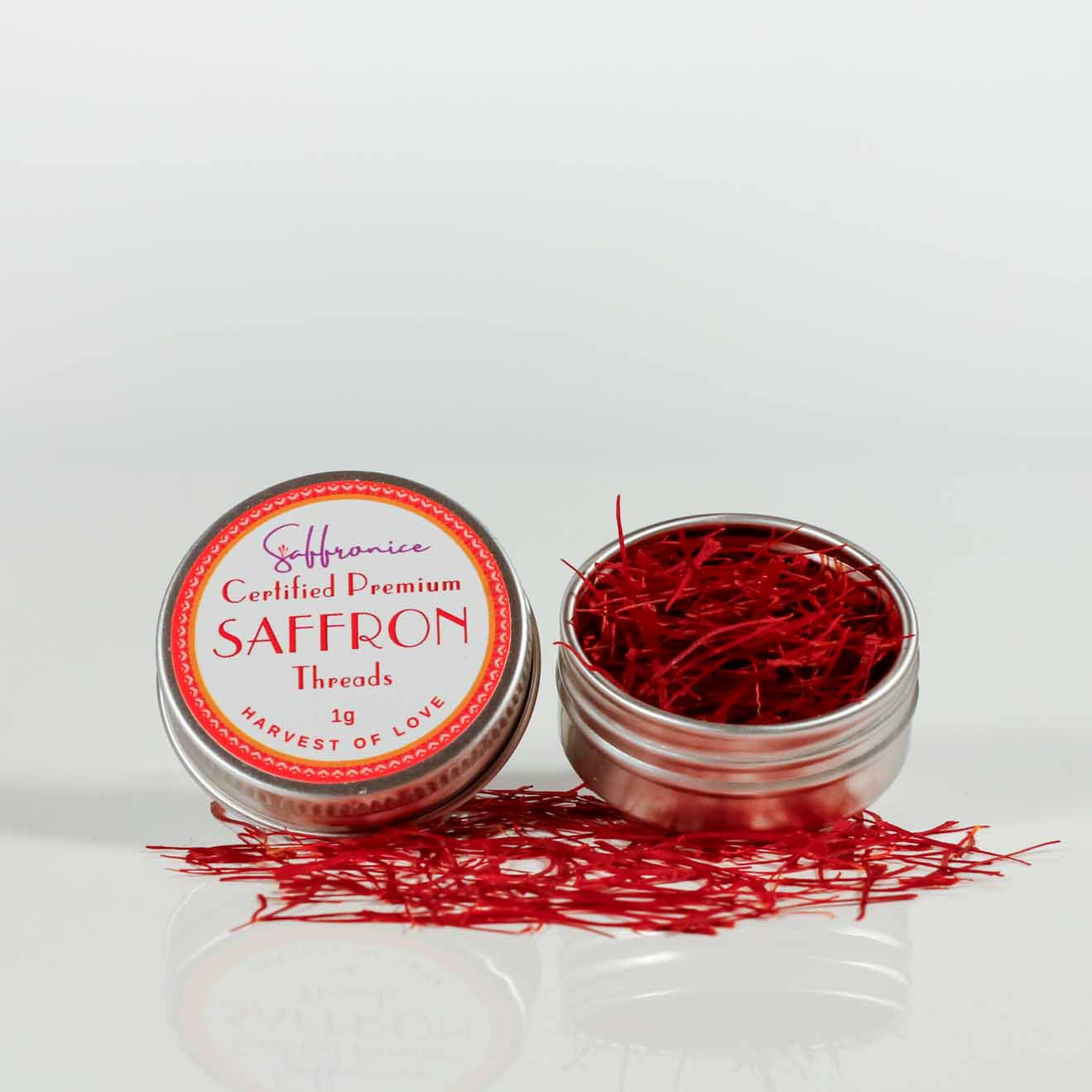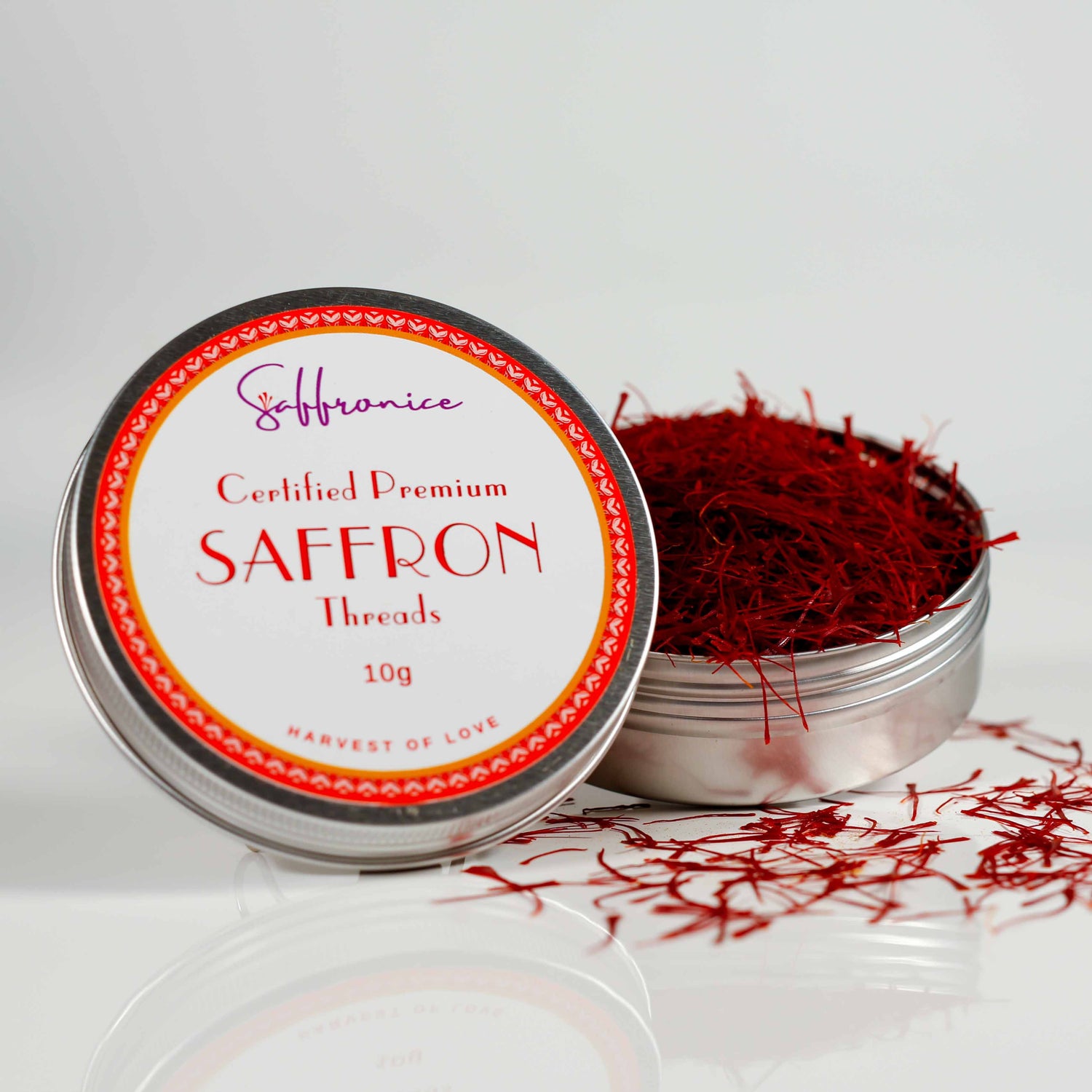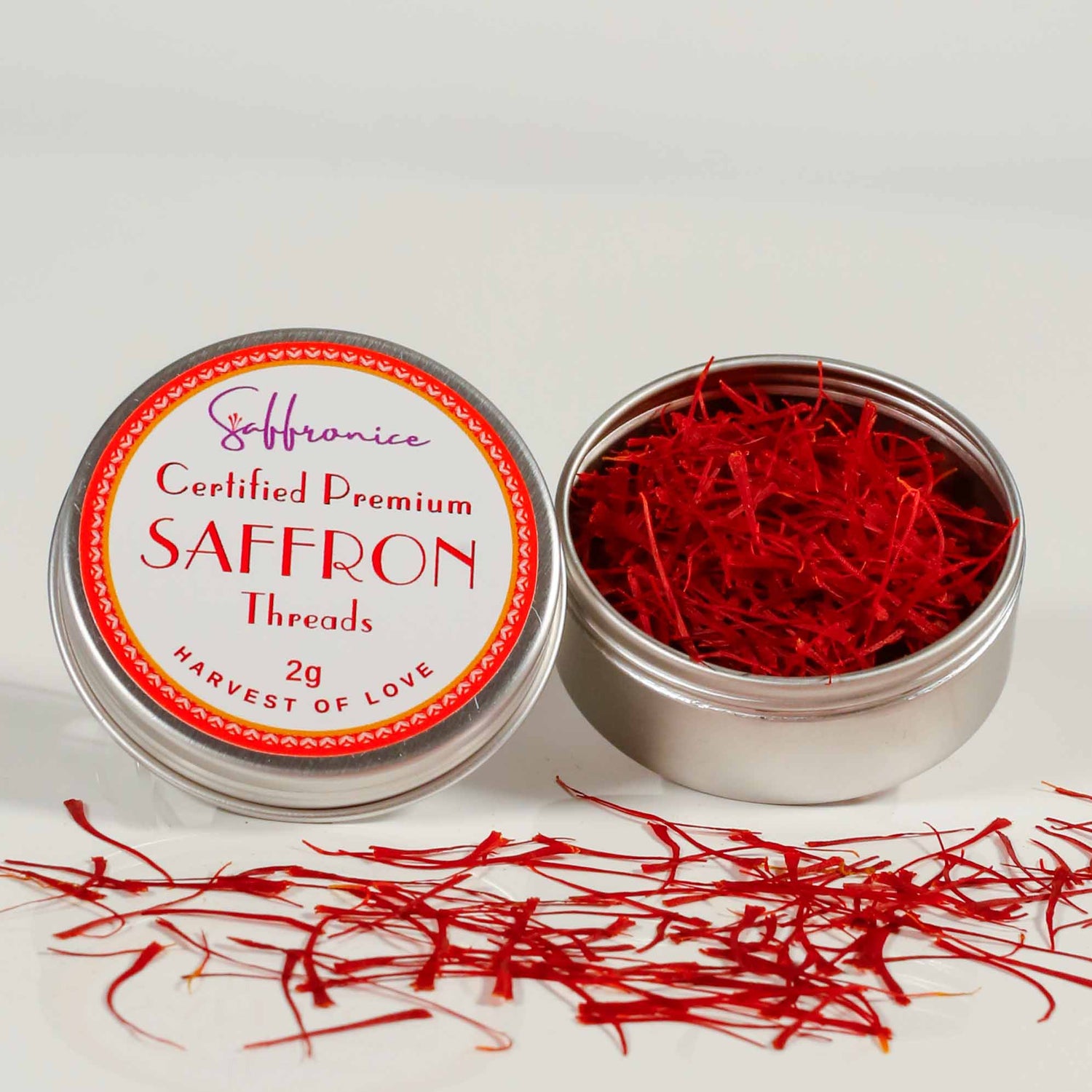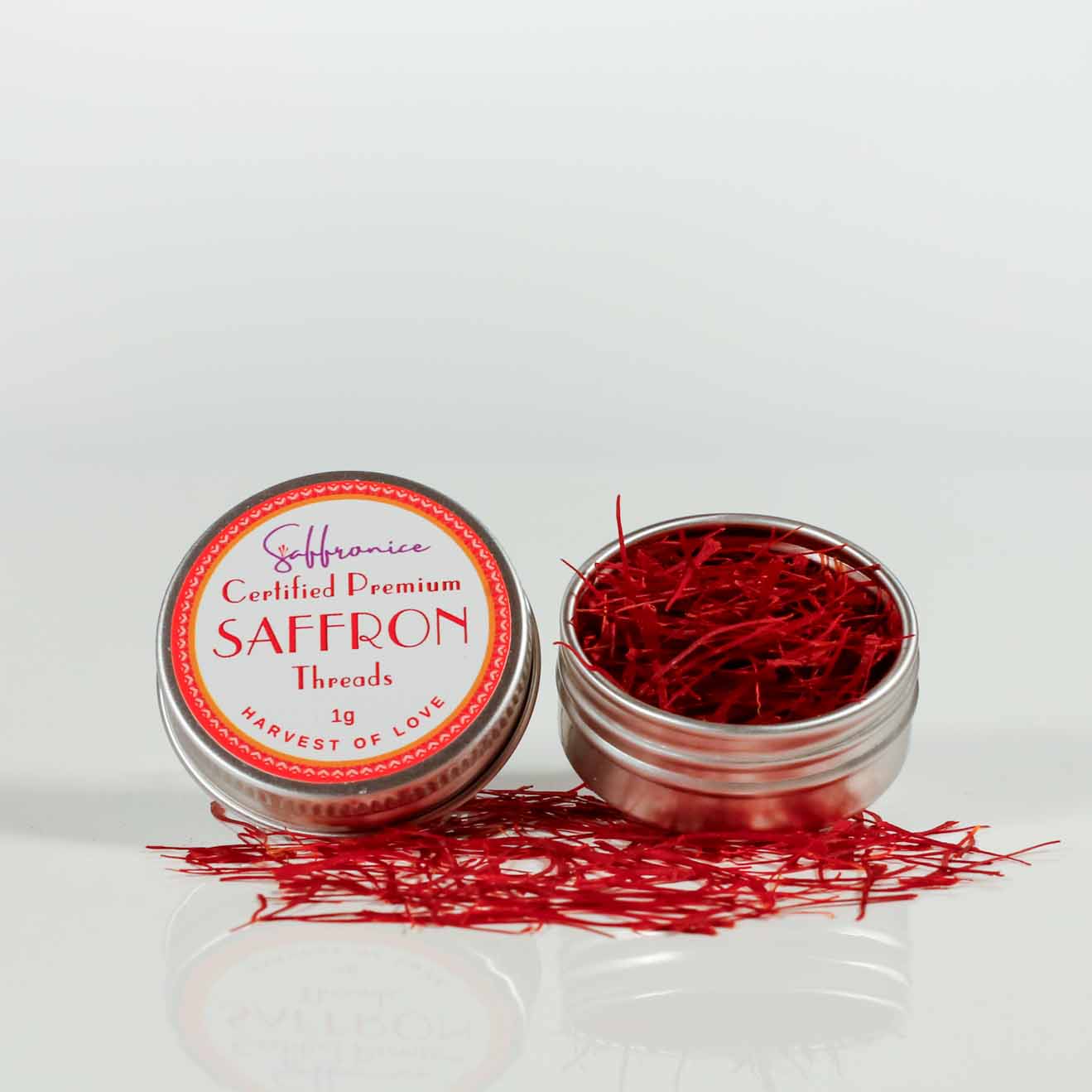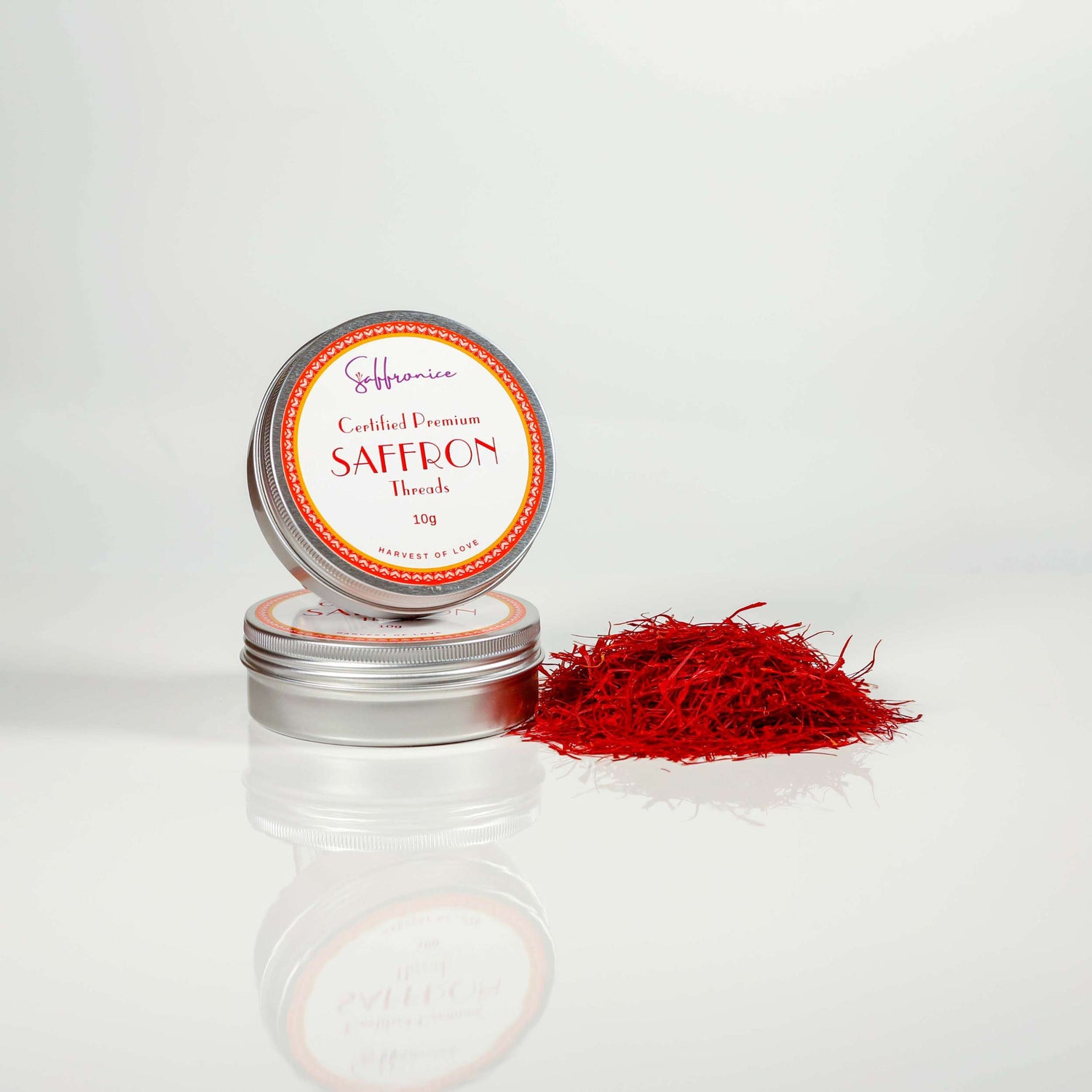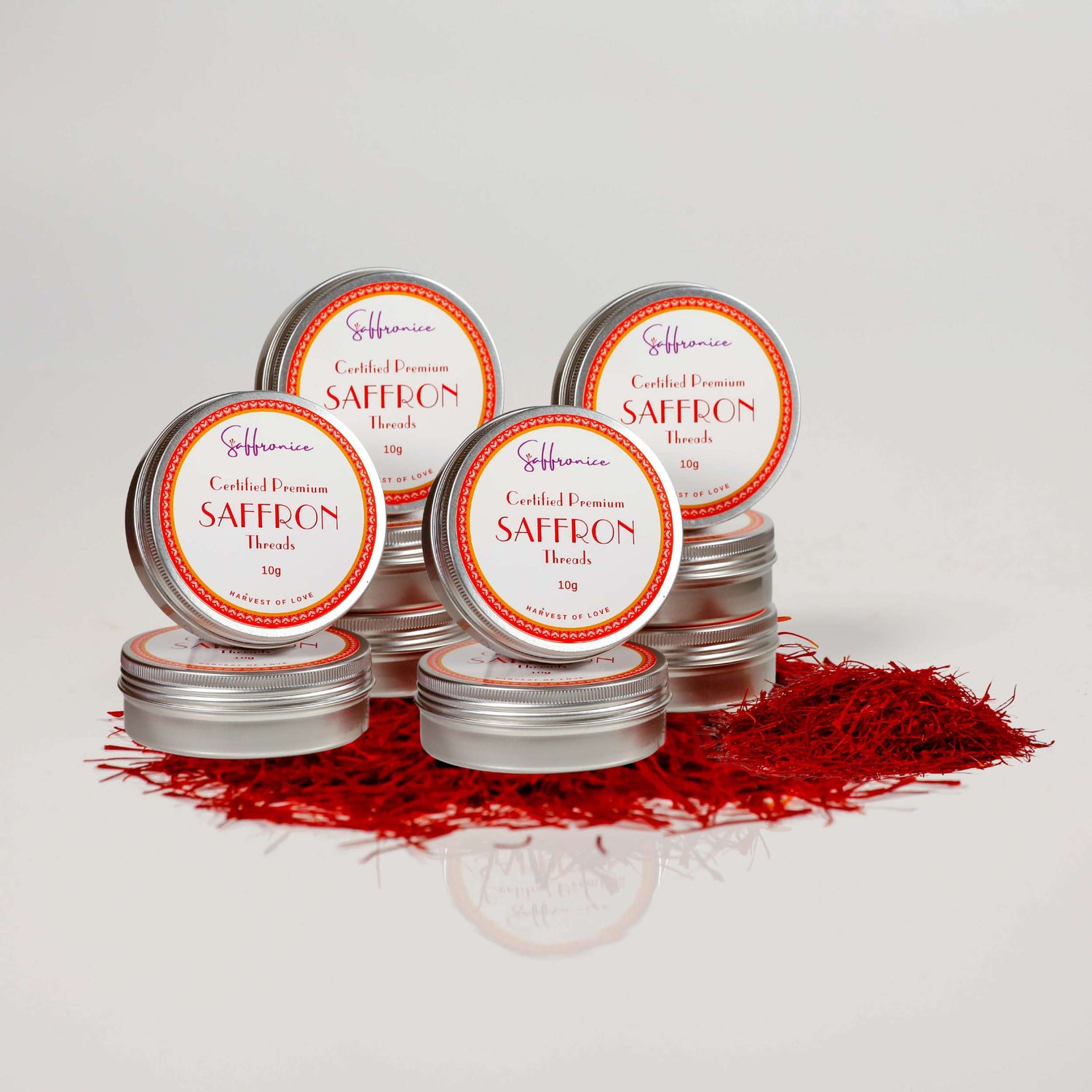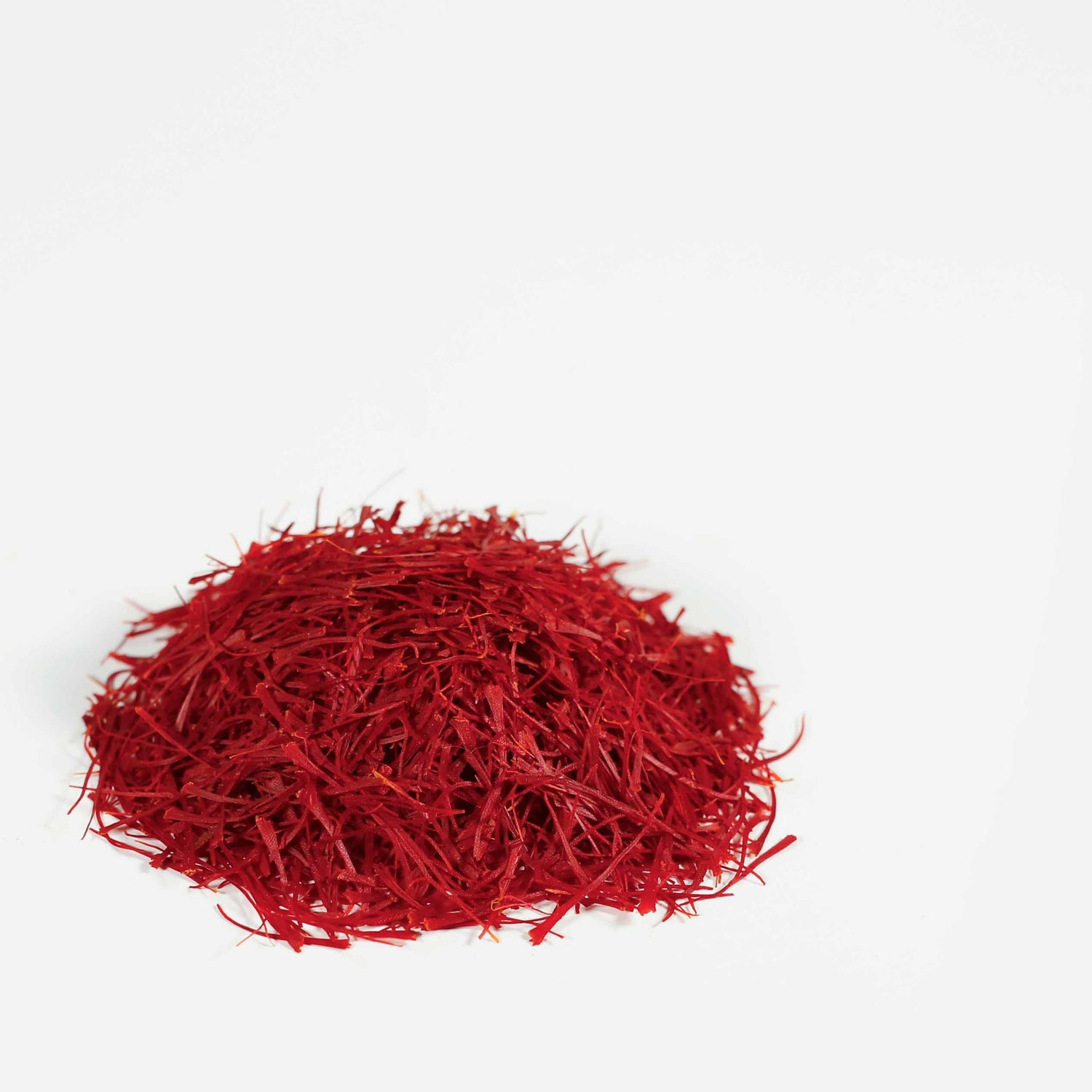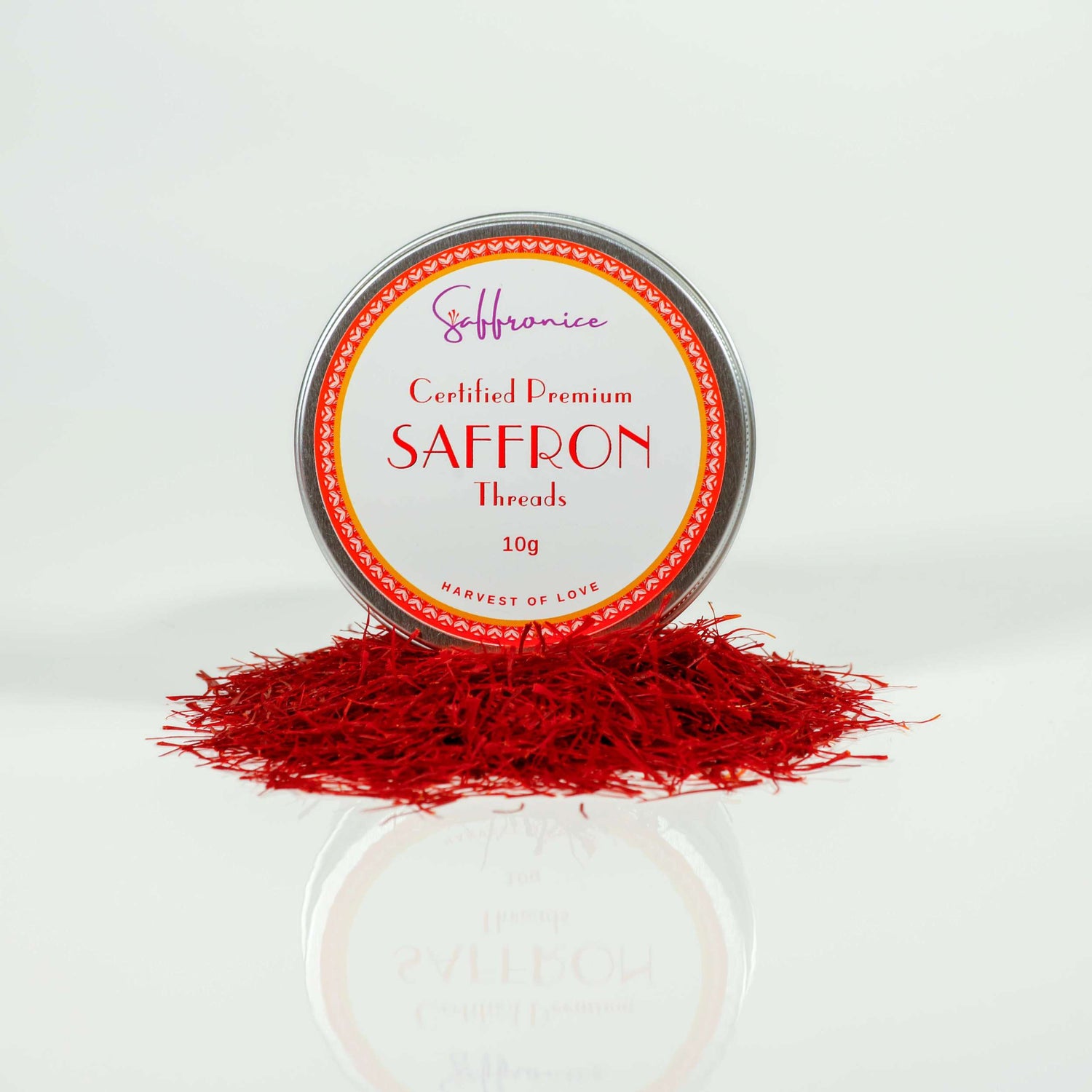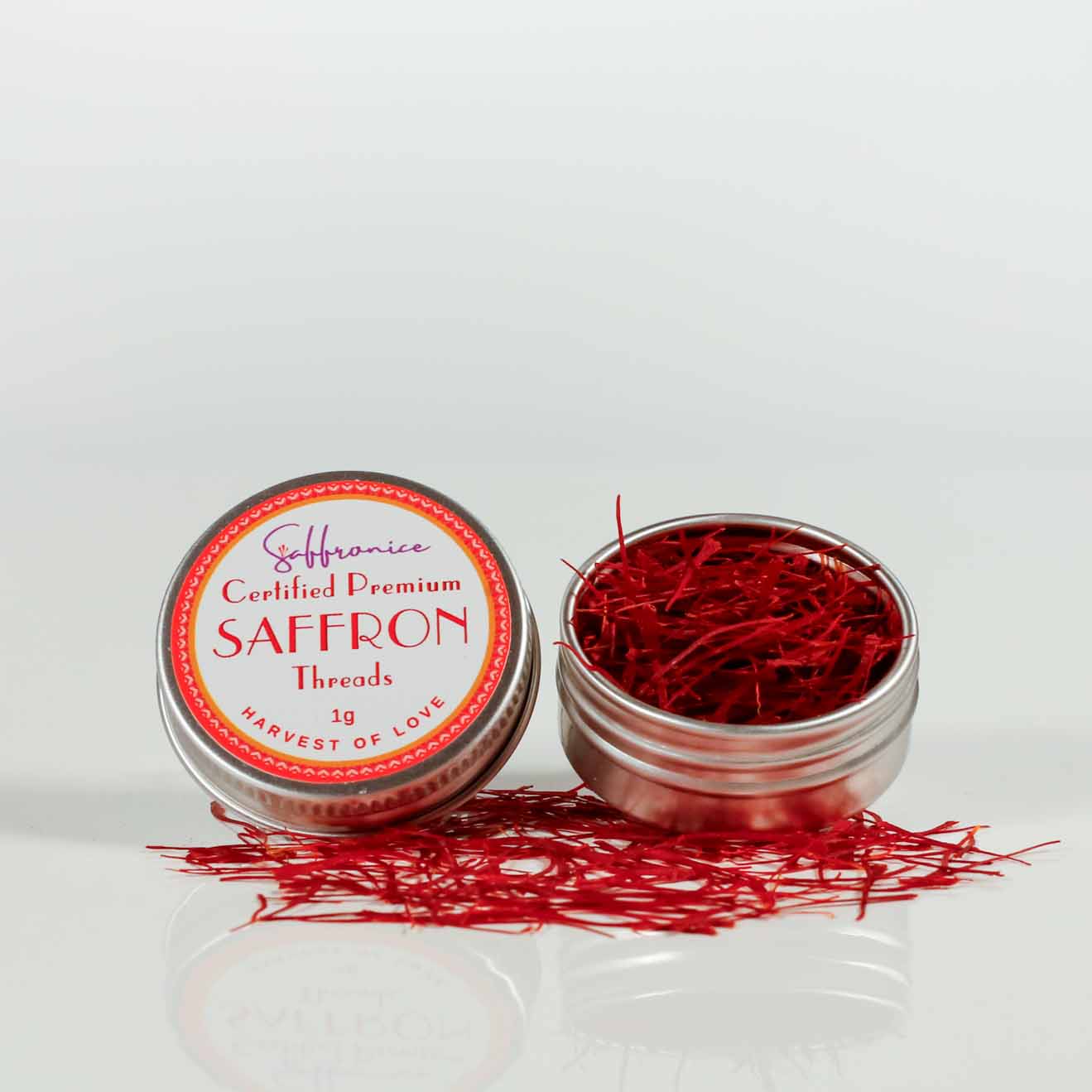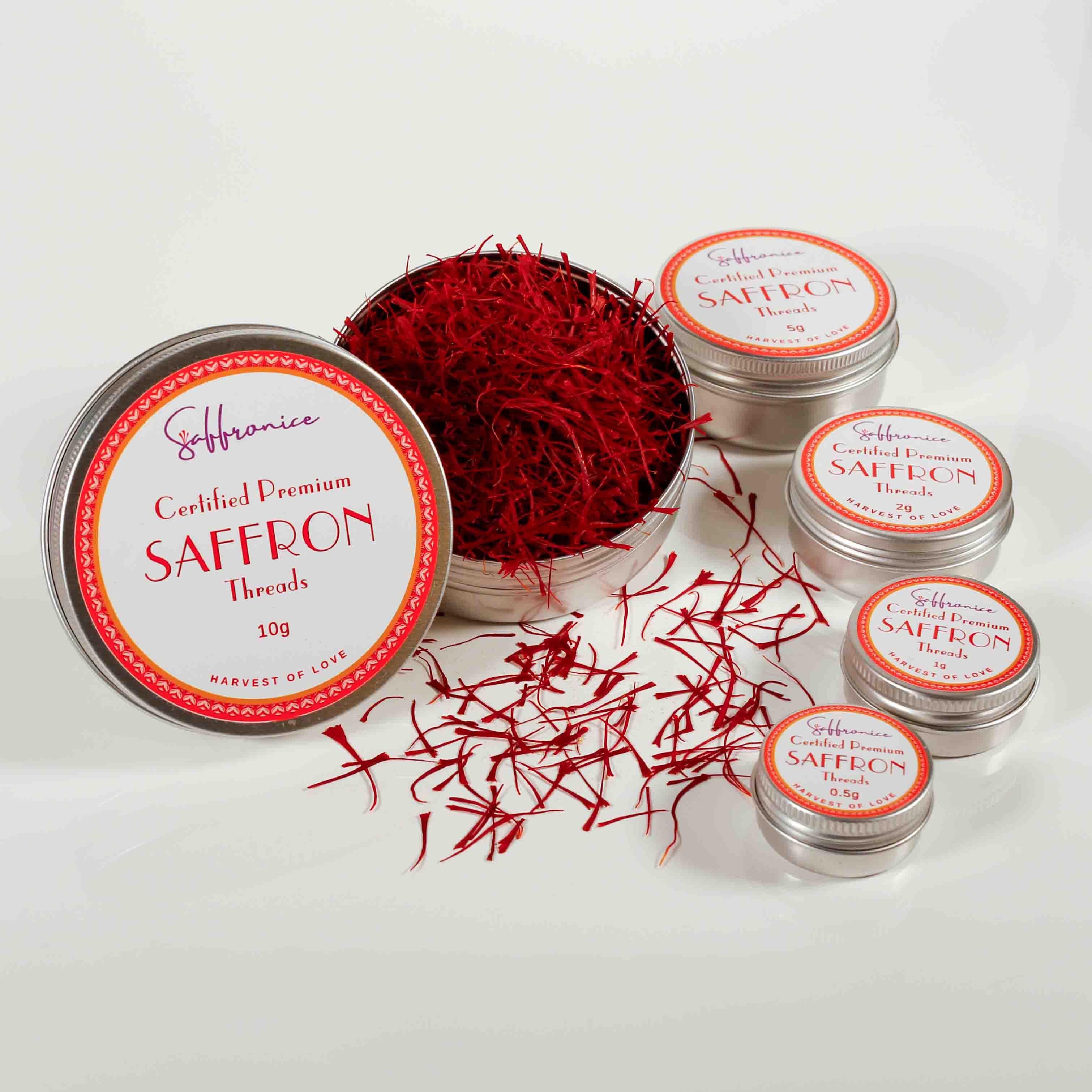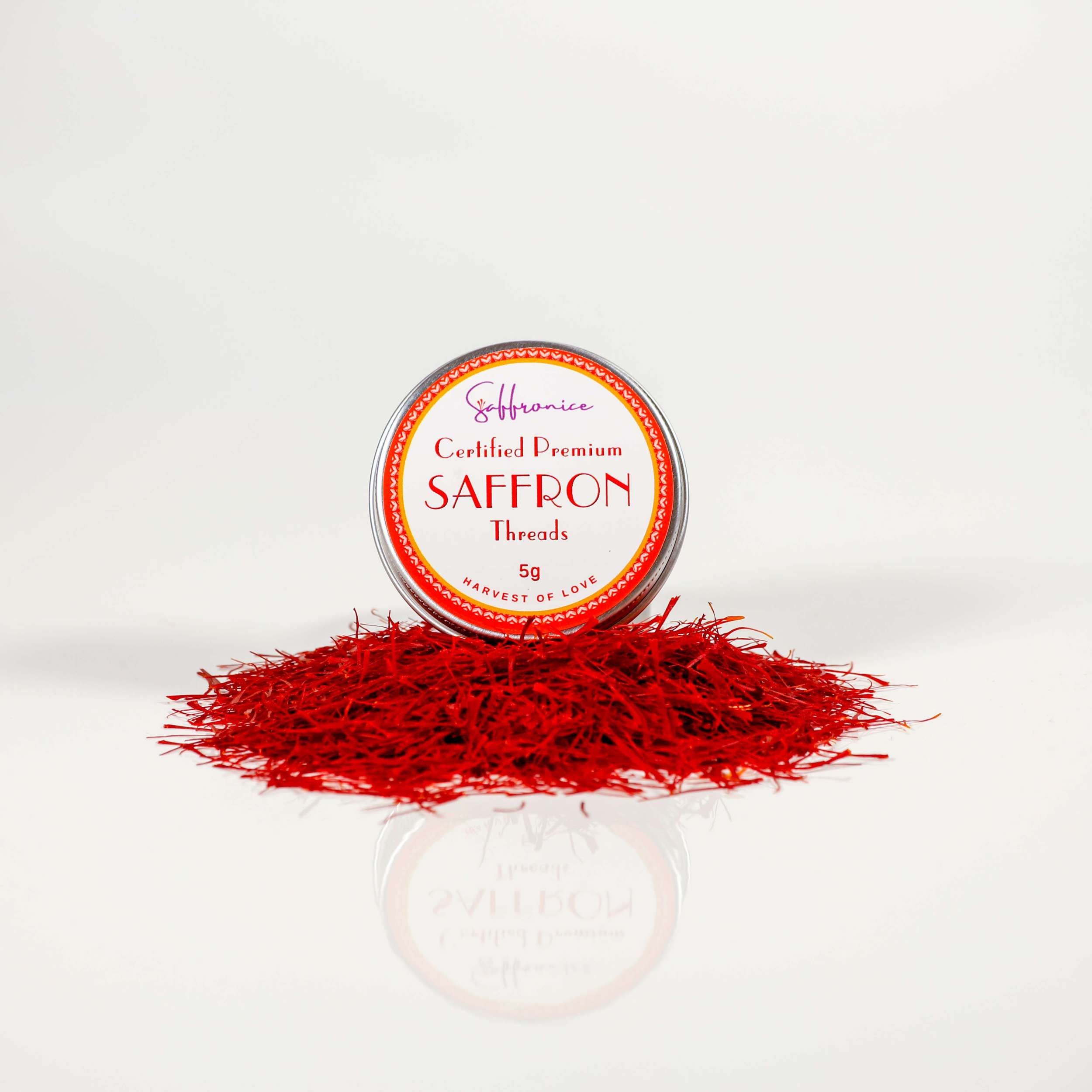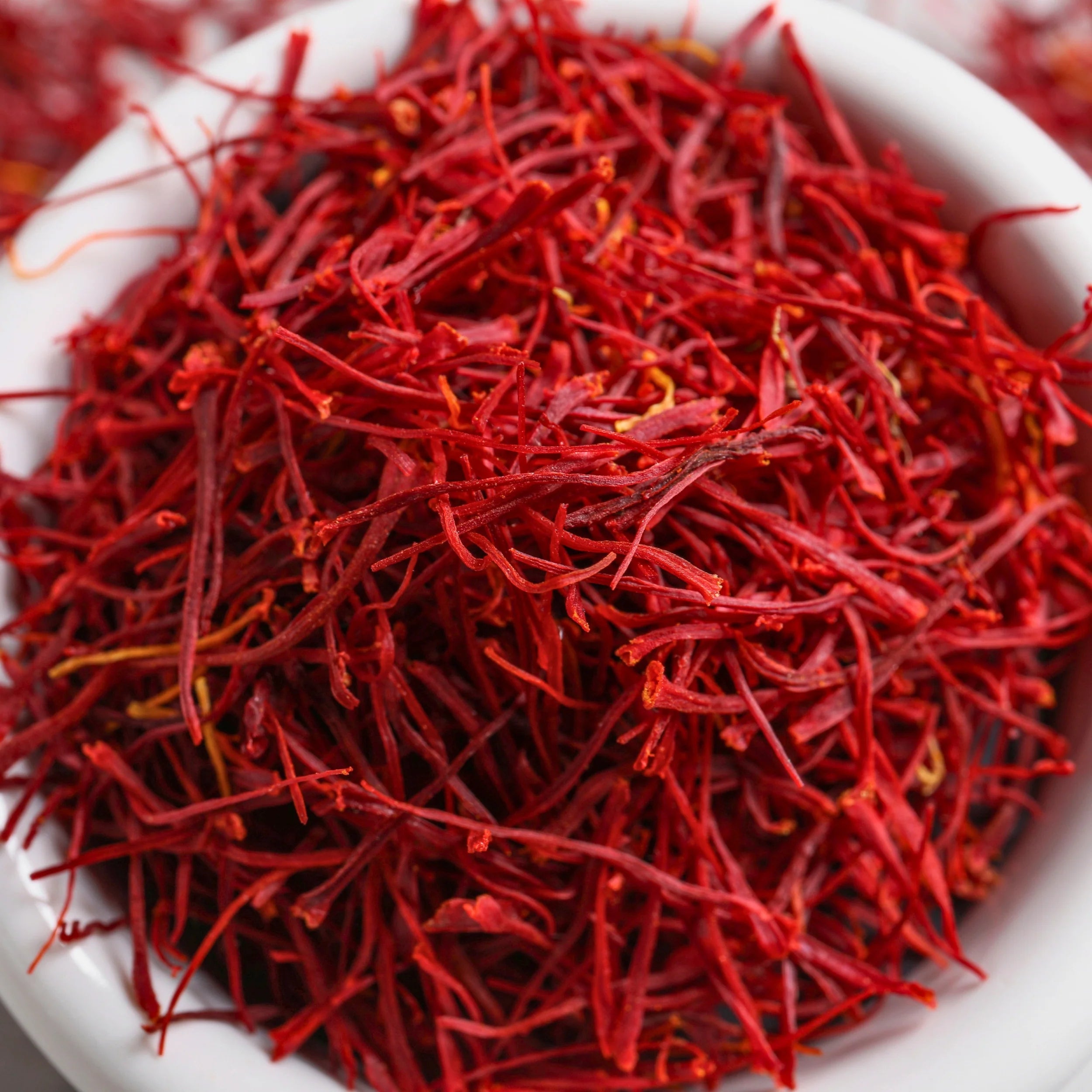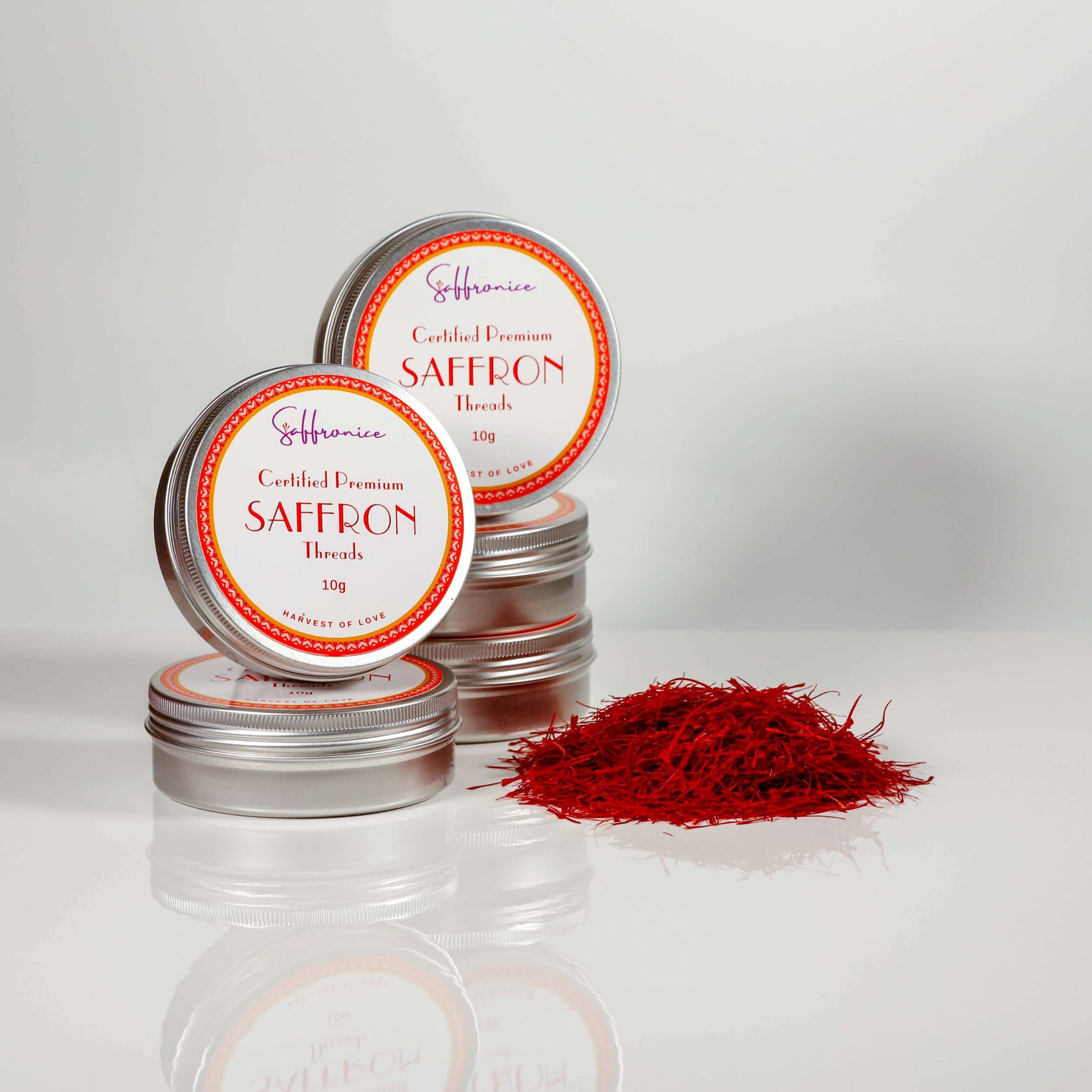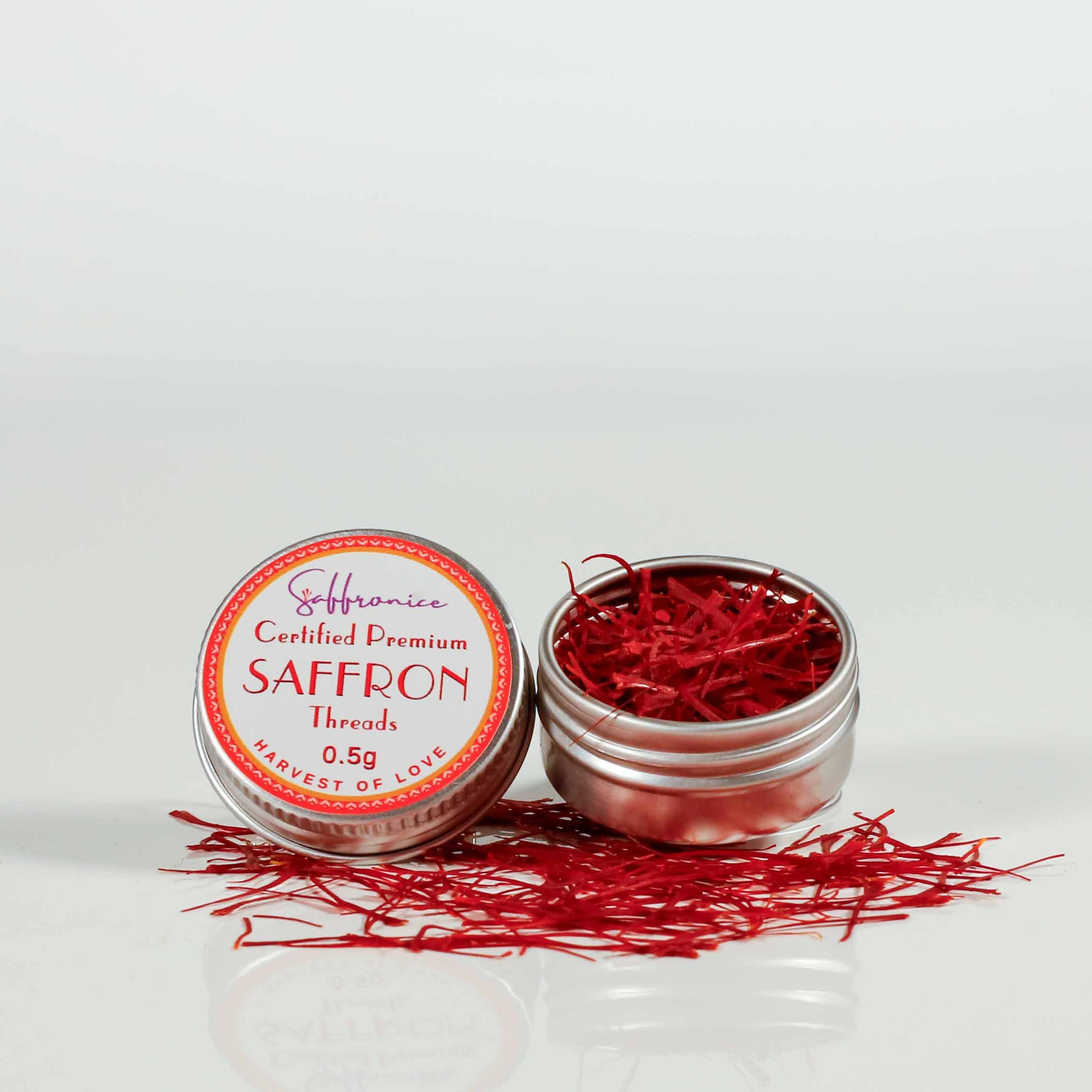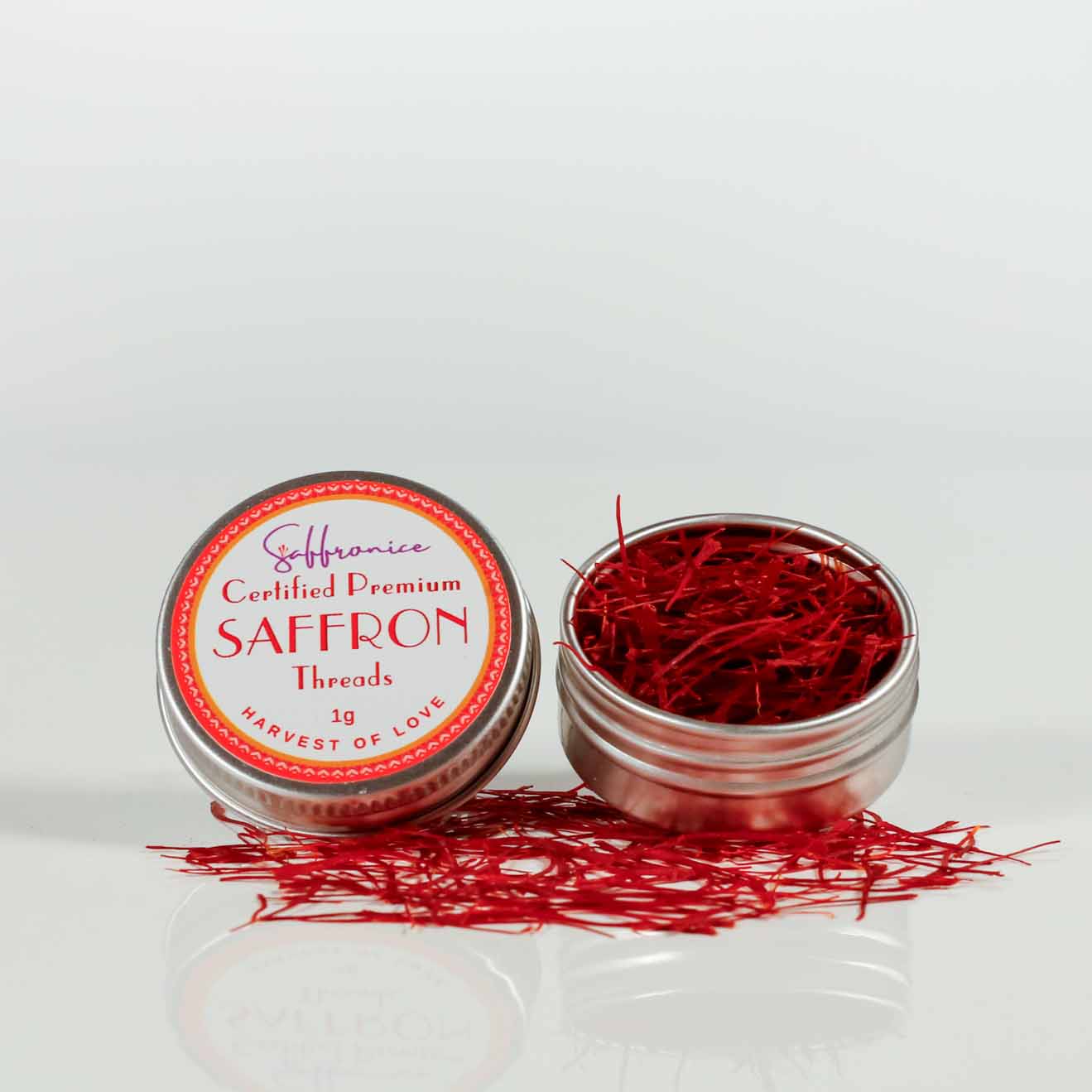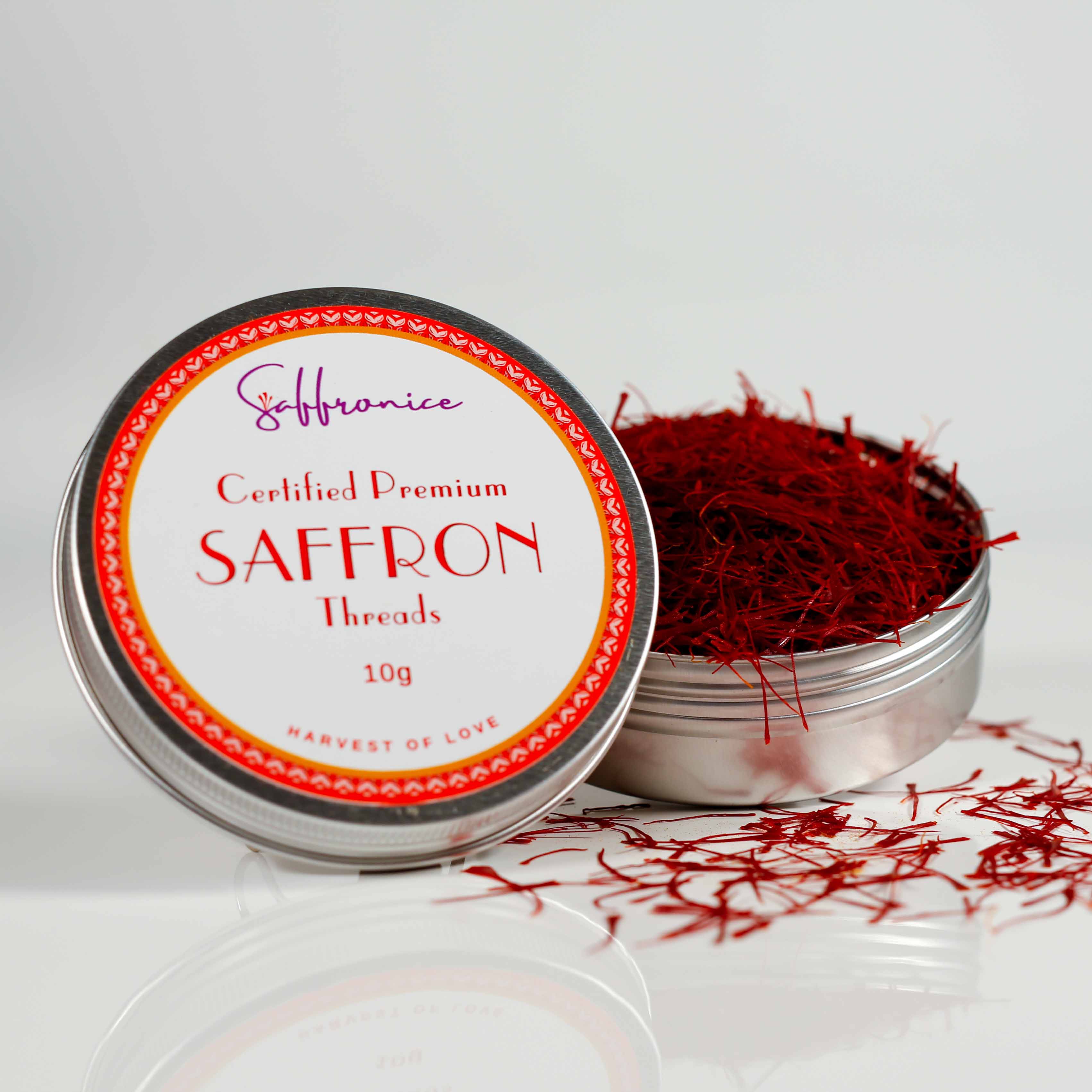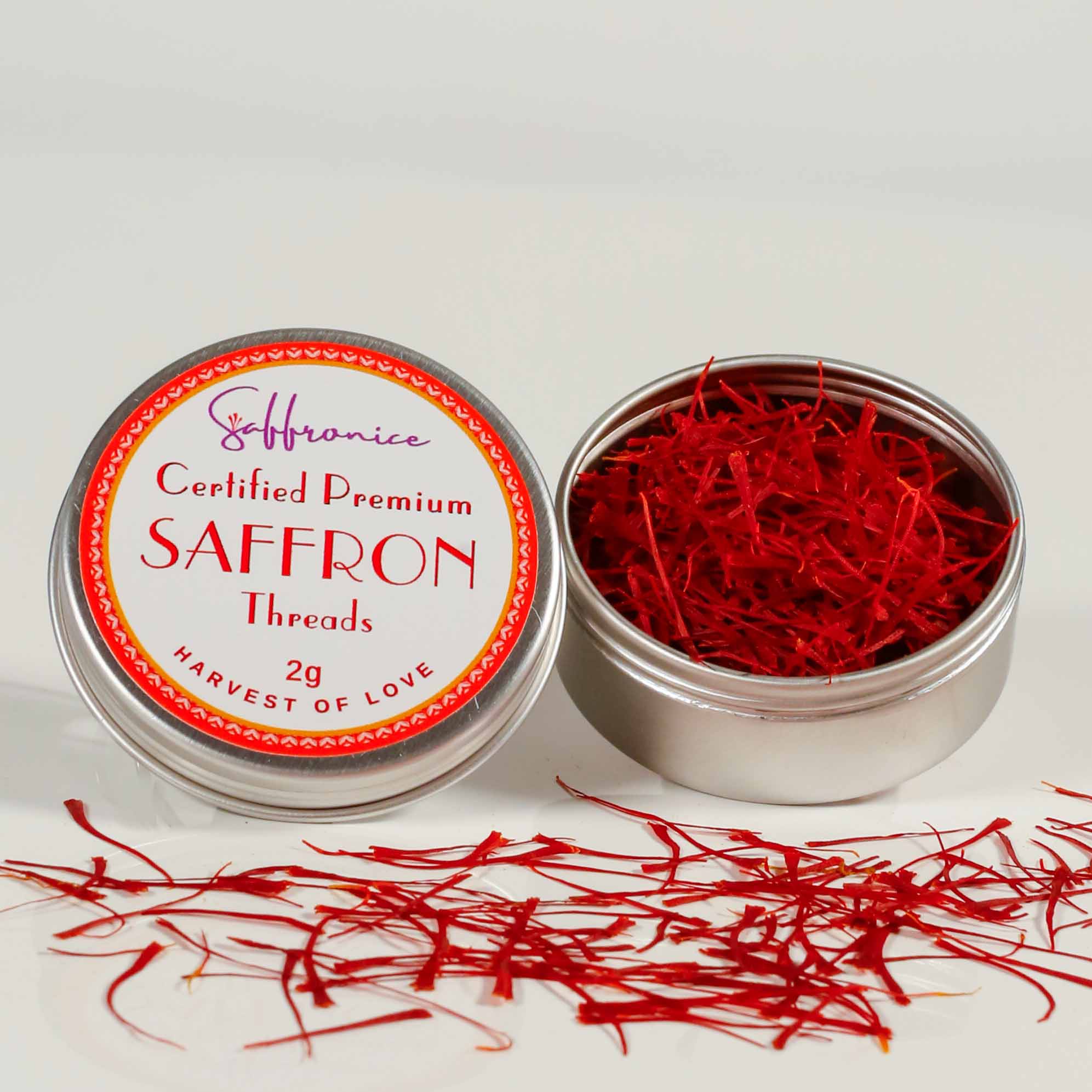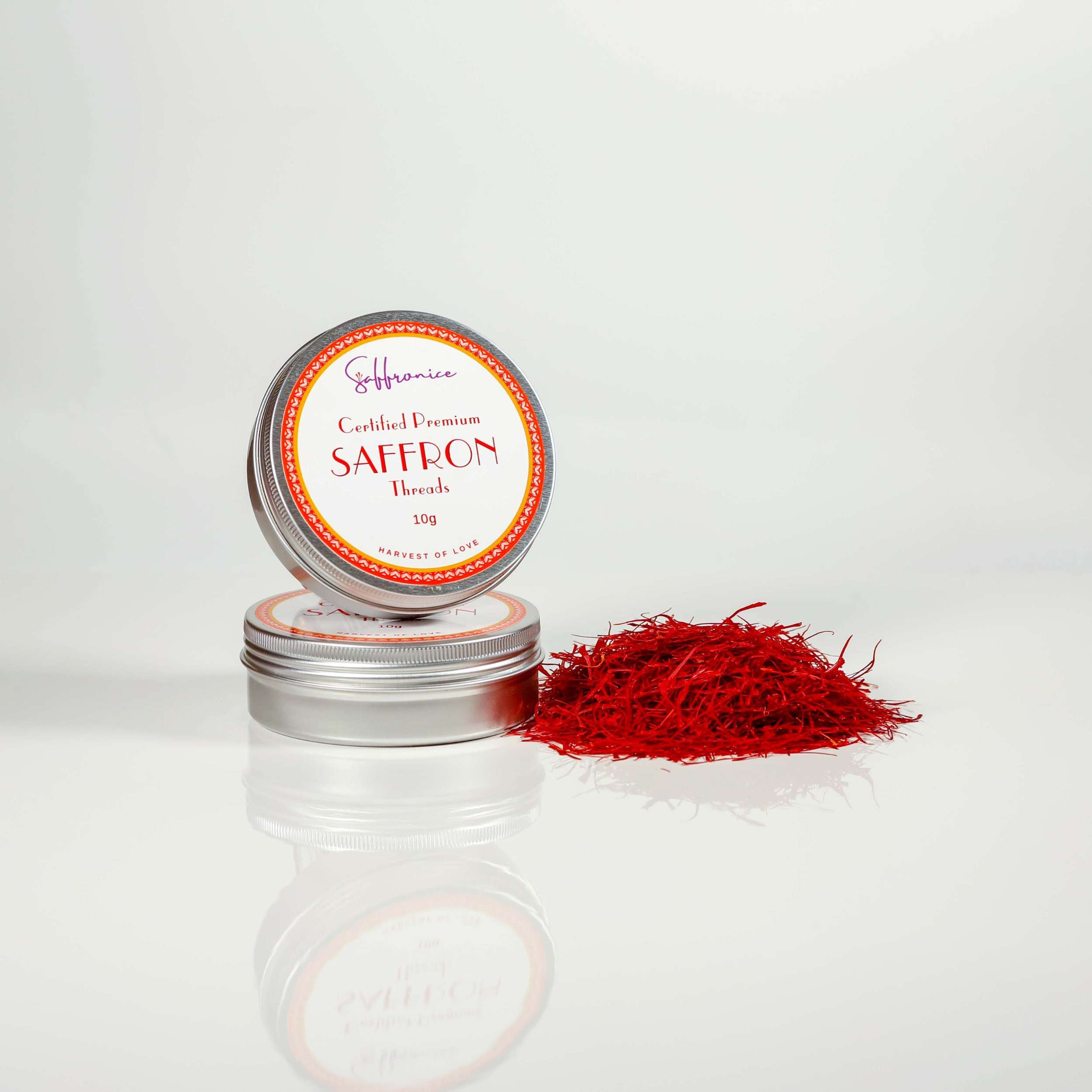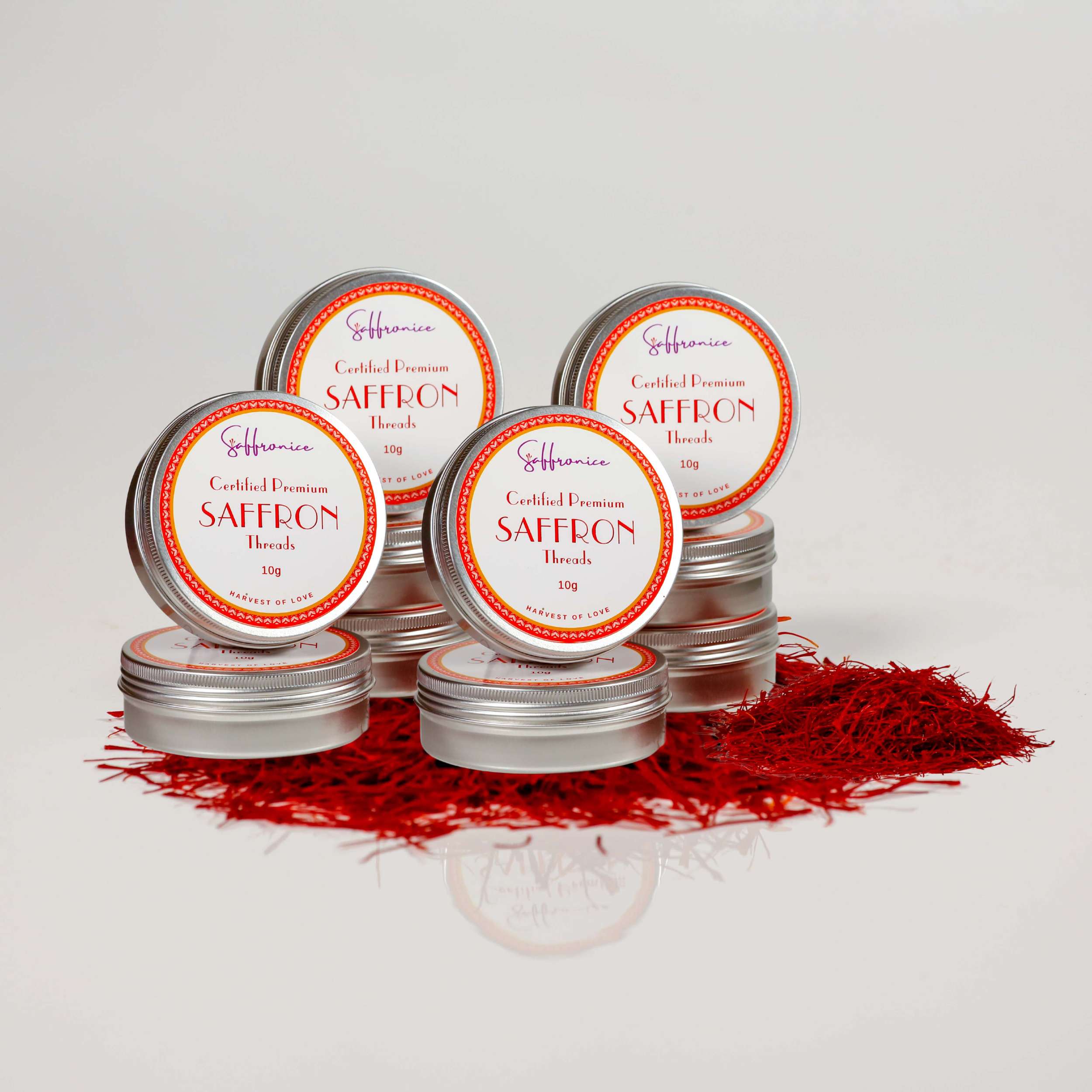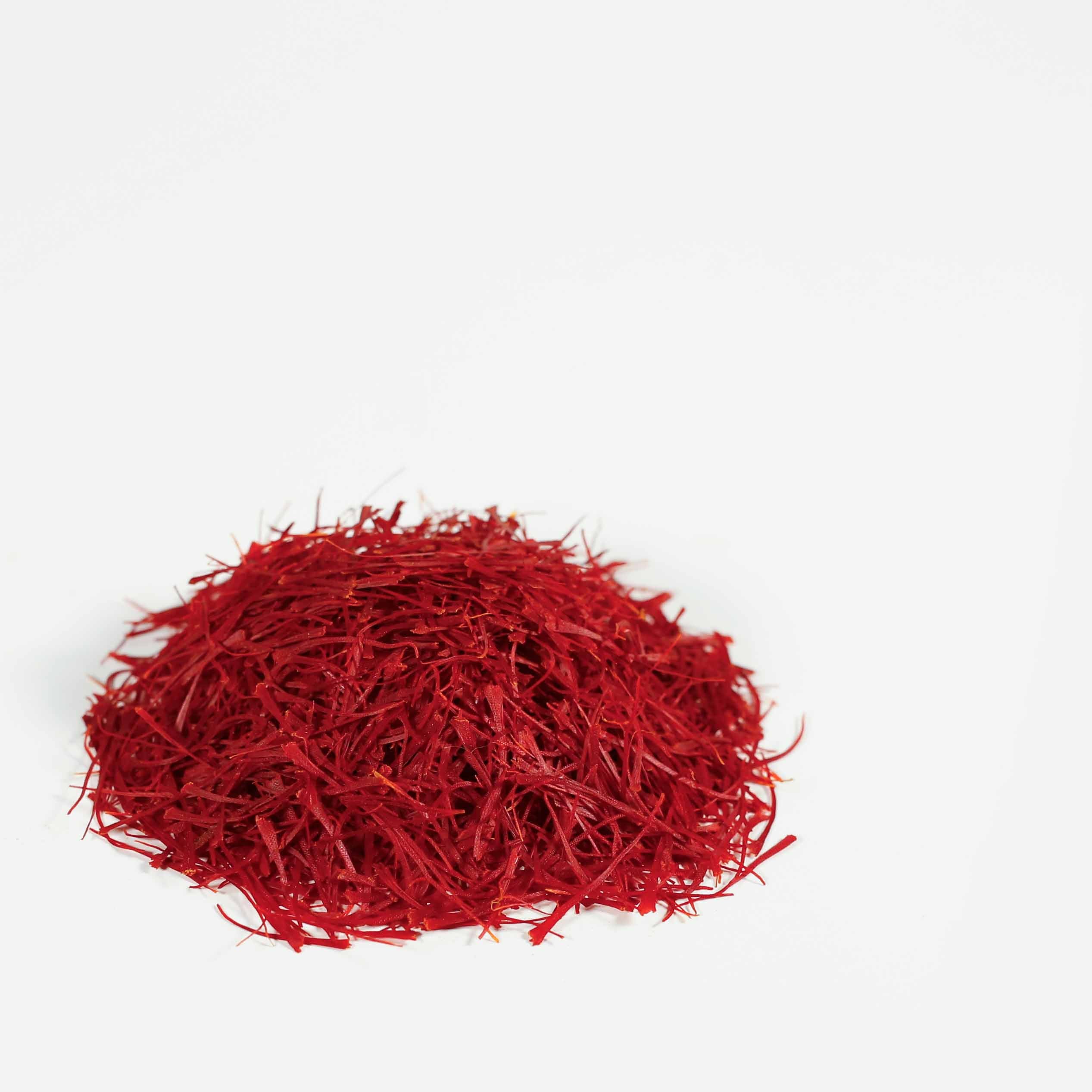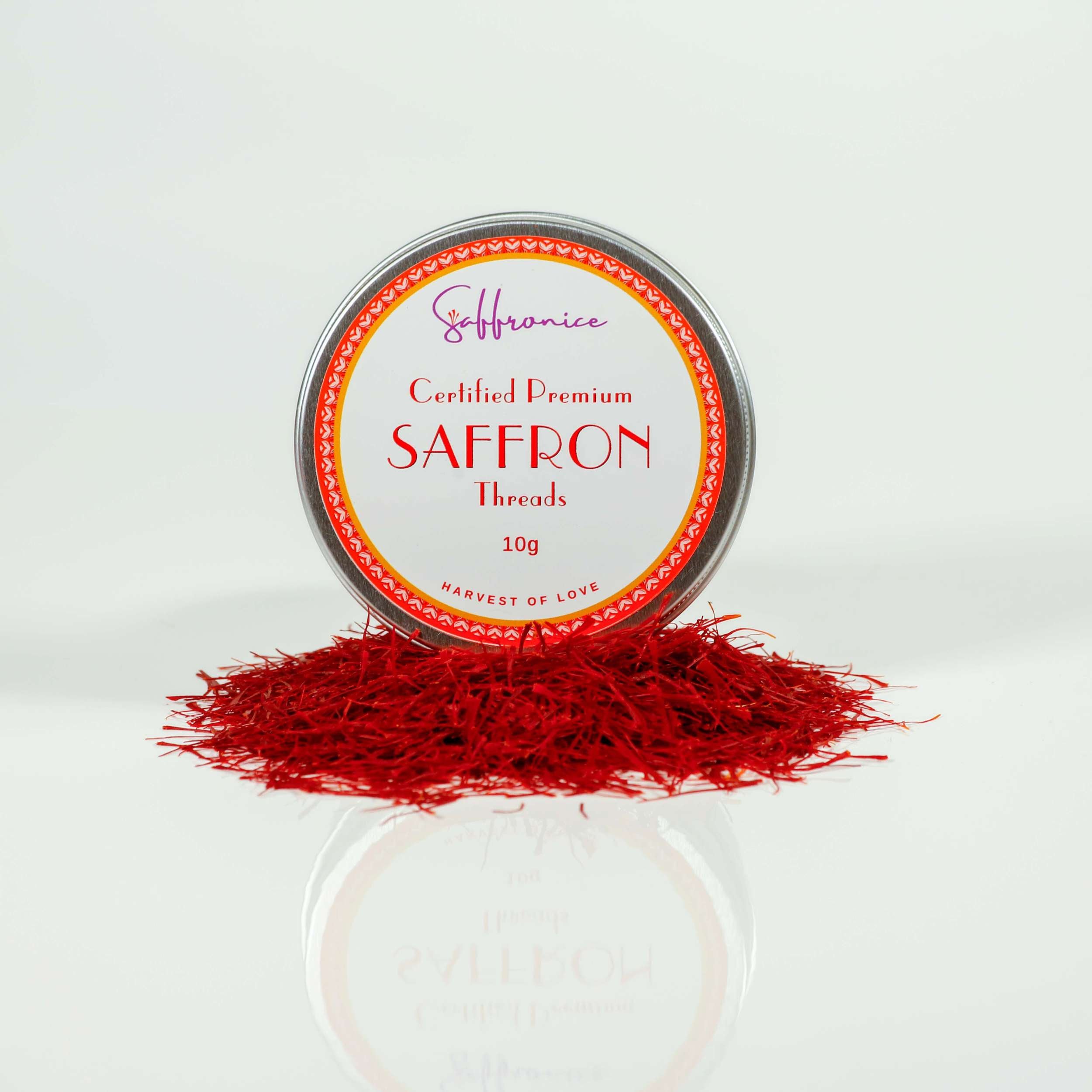Unveiling the Mystique of Saffron: A Spice Steeped in History
Saffron, often called the 'Red Gold', is more than a culinary delight. This vibrant spice, derived from the dried stigmas of the Crocus sativus flower, holds a rich tapestry of history and tradition. Used since ancient times, Saffron has graced the tables of medieval kings, coloured the robes of Buddhist monks, and even been a coveted item along the Silk Road. Its value, often surpassing gold by weight, is attributed to its labour-intensive harvesting process, which takes approximately 75,000 saffron crocuses to produce a single pound of saffron spice and its multifaceted applications.
Historically, Saffron was celebrated for its medicinal properties in ancient Persia, Egypt, and Greece. It treated everything from melancholy to fevers and as a powerful aphrodisiac. In the realm of cuisine, Saffron has been a staple in Middle Eastern, Mediterranean, and South Asian cooking, treasured for its unique flavour and ability to impart a rich golden hue to dishes. Beyond the kitchen, it has been used in dyes, perfumes, and even as an offering in religious ceremonies.
Saffron Today: More Than Just a Spice
In recent years, the intrigue surrounding Saffron has expanded beyond its traditional uses. Modern science has begun to uncover the possible health goodness of this ancient spice, leading to renewed interest in its properties and applications, particularly in neurodegenerative diseases like Alzheimer's.
Alzheimer's Disease: A Growing Global Concern

Alzheimer's disease, a progressive neurodegenerative disorder, stands as one of the most significant health challenges of our time. It's characterised by the deterioration of memory and cognitive functions, drastically impacting the lives of not just those diagnosed but also their families and caregivers. The disease primarily affects older individuals, although early-onset Alzheimer's can occur in younger people.
The Impact of Alzheimer's on Individuals and Society
The journey with Alzheimer's is often heart-wrenching, as individuals gradually lose their ability to remember, think, make decisions, and eventually perform basic daily activities. This affects their quality of life and places an important emotional and financial load on families and healthcare systems. With ageing populations worldwide, the prevalence of Alzheimer's is expected to rise, emphasising the need for effective treatments and care strategies.
Current Treatments for Alzheimer's Disease
Current treatments for Alzheimer's focus mainly on negotiate symptoms and improving the quality of existence for patients. Medicine like cholinesterase inhibitors and memantine can aid with psychological symptoms, but they do not halt the progression of the disease. There's also a growing emphasis on non-pharmaceutical interventions, such as cognitive therapy, lifestyle changes, and diet, to help manage symptoms and potentially slow disease progression.
The Quest for Better Solutions
The quest for more effective treatments for Alzheimer's is ongoing, with research exploring everything from advanced pharmaceuticals to natural remedies. This search for alternatives is driven by the limited effectiveness of current medications, their potential side effects, and the desire to find treatments that can alter the course of the disease. Saffron has emerged as a potential complementary treatment option in this context, sparking interest and hope in the scientific community and beyond.
In conclusion, the journey from the ancient spice routes to modern laboratories illustrates the enduring allure of Saffron. As we delve deeper into the potential connection between Saffron and Alzheimer's disease in subsequent sections, we uncover the promise this timeless spice holds in addressing one of the most challenging diseases of our age. Stay tuned as we explore the fascinating science behind Saffron's potential impact on Alzheimer's disease.
Delving into the Science: Saffron and Alzheimer's Research

Exploring Saffron's role in combating Alzheimer's disease has led to several intriguing scientific studies. These studies, rigorous in methodology and significant in their findings, offer a glimpse into the potential of this ancient spice as a tool in the fight against neurodegenerative diseases.
Critical Research Studies on Saffron and Alzheimer's
One landmark study published in the Journal of Clinical Pharmacy and Therapeutics investigated the effects of Saffron on cognitive function in patients with mild to moderate Alzheimer's disease. In this double-blind, placebo-controlled trial, participants were given either a saffron extract or a placebo over 16 weeks. The results indicated that those who received Saffron showed improved cognitive function compared to the placebo group.
Another pivotal study, featured in the Journal of Behavioral and Brain Science, focused on the molecular mechanisms behind Saffron's impact on Alzheimer's. This research highlighted crocin and safranal's antioxidant and anti-inflammatory properties, two critical compounds in Saffron. These compounds were found to inhibit the aggregation of beta-amyloid proteins, a hallmark of Alzheimer's disease, suggesting a possible preventive effect against the advance of the disorder.
Comparing Saffron with Traditional Alzheimer's Medications
When compared to traditional Alzheimer's medications, such as donepezil and memantine, Saffron has shown promise as a complementary treatment. A study in the Journal of Psychopharmacology compared the efficacy of saffron extract to donepezil over 22 weeks. The results demonstrated that Saffron was as effective as donepezil in improving cognitive function, with the added benefit of fewer digestive side effects.
Evaluating Safety and Side Effects
The safety profile of Saffron in these studies is noteworthy. Participants generally tolerated Saffron well, with fewer reported side effects than traditional Alzheimer's medications. However, it's important to note that the studies emphasised the need for careful dosage control, as high amounts of Saffron can be toxic. The research also underscored the importance of consulting healthcare providers before adding Saffron to an Alzheimer's treatment regimen, mainly due to potential interactions with other medications.
Implications of the Findings
The implications of these studies are profound. They suggest that Saffron, with its unique compounds, could play a role in slowing down the cognitive decline associated with Alzheimer's. This offers a beacon of hope for patients and families seeking alternatives or complements to existing treatments. Moreover, these findings open new avenues for further research into how natural substances like Saffron can contribute to neurodegenerative disease management.
In summary, the scientific exploration into Saffron's effect on Alzheimer's disease paints a promising picture. While more research is needed to fully understand and validate these findings, the existing studies provide compelling evidence of Saffron's potential as a safe and effective supplement in treating Alzheimer's. As we seek better solutions for this complex disease, Saffron emerges as a potential ally, rooted in ancient tradition yet validated by modern science.
Understanding Saffron's Mechanisms of Action in the Brain

To appreciate how Saffron may benefit individuals with Alzheimer's disease, it's essential to delve into its mechanisms of action within the brain. This section explores the intriguing ways Saffron's unique properties and compounds interact with neurological processes.
Anti-Inflammatory and Antioxidant Effects of Saffron
Saffron's potential impact on Alzheimer's can be partly attributed to its anti-inflammatory and antioxidant properties. Inflammation and oxidative stress are fundamental helper to the evolution and progression of Alzheimer's disease. The increase of beta-amyloid plaques and tau tangles, characteristic of Alzheimer's, leads to an inflammatory response and oxidative damage in the brain. This damage, in turn, exacerbates the disease's progression.
Saffron's anti-inflammatory properties help reduce this inflammation, potentially slowing down the degenerative process. Additionally, its antioxidants combat oxidative stress, protecting brain cells from damage caused by free radicals. By mitigating these two critical factors, Saffron may help preserve cognitive function and slow the progression of Alzheimer's.
Key Compounds in Saffron: Crocin and Safranal
The magic of Saffron lies in its bio-active compounds, particularly crocin and safranal. Crocin, the compound responsible for Saffron's distinctive colour, has been shown to have neuroprotective effects. Studies suggest that crocin helps in the modulation of neurotransmitters, the reduction of inflammation, and the protection against oxidative stress. These actions are believed to contribute to its potential benefits in slowing cognitive decline in Alzheimer's patients.
Safranal, which gives Saffron its aroma, is also significant in its potential therapeutic effects. Research indicates that safranal can influence brain chemistry in several ways. It has been observed to have antioxidant properties, protect against neuron degeneration, and even modulate the activity of certain neurotransmitters involved in cognition and mood regulation.
The Neurological Benefits of Saffron's Compounds
The combined effects of crocin and safranal make Saffron a promising candidate for managing Alzheimer's disease. By protecting neurons, reducing inflammation, and combating oxidative stress, these compounds help maintain the structural and functional integrity of the brain. Furthermore, their potential to modulate neurotransmitters could have implications for cognitive function, mood and behaviour, which are often affected in Alzheimer's disease.
In conclusion, the mechanisms of action of Saffron in the brain highlight its potential as a multifaceted approach to managing Alzheimer's disease. By targeting critical processes in the disease's progression, Saffron and its crocin and safranal compounds offer a glimpse into a future where natural remedies could be more significant in neurodegenerative disease management.
Scientific case studies and reviews

Saffron in the Spotlight: A Natural Hope for Alzheimer's
Alzheimer's disease, a prevalent brain disorder, primarily affects older adults, leading to memory loss and cognitive challenges. With limited effective medications available for mild to moderate Alzheimer's, the quest for better treatments has turned towards nature.
Enter Saffron, the vibrant spice from the Crocus sativus flower, now catching the eye of researchers for its potential brain health benefits. Here's a friendly breakdown of what studies are saying about Saffron's role in combating Alzheimer's:
-
Fighting Brain Enemies with Antioxidants: Like superheroes, Saffron's antioxidants swoop to defend brain cells from harmful molecules.
-
Calming the Brain's Storms: Imagine Saffron as a soothing balm, reducing brain inflammation, a suspect in the Alzheimer's mystery.
-
Guarding Brain Cells: Saffron might act as a protective shield, keeping brain cells safe from harm.
-
Boosting Brain Power: Some studies suggest Saffron could be like a brain gym, enhancing memory, learning, and overall brain function.
-
Blocking Brain Bullies: It's believed Saffron could help stop the formation of those mean amyloid plaques and tangles that are hallmarks of Alzheimer's.
-
Reducing Brain Inflammation: Saffron might also be a peacekeeper, helping to lower brain inflammation linked to Alzheimer's progression.
The exciting part? Research hints that Saffron could delay Alzheimer's onset, slow its march, or ease its symptoms. But the scientific world says, "Hold on; we need more proof!" More clinical trials are on the wish list to confirm these benefits and determine how best to use Saffron in the Alzheimer's battle. While the current findings are hopeful, there's still more to learn about unleashing Saffron's full potential against brain diseases like Alzheimer's.
-
A study titled "Prospects of Saffron and its Derivatives in Alzheimer's Disease
The article "" outlines the efficacy of Saffron in treating cognitive impairment in AD, highlighting its role in modulating key factors such as amyloid beta and neurofibrillary tangles.
-
A clinical trial, "Saffron in the treatment of patients with mild to moderate Alzheimer's disease: a 16-week, randomised and placebo-controlled trial," provides evidence for the safety and effectiveness of Saffron in treating mild to moderate Alzheimer's disease.
-
"Saffron for mild cognitive impairment and dementia: a systematic review and meta-analysis of randomised clinical trials" examines the risk of bias in trials studying the effects of Saffron on mild cognitive impairment and dementia, providing a comprehensive overview of current research in this area.
-
The review "Efficacy and Safety of Saffron Supplementation: Current Clinical Findings" discusses the broader scope of Saffron's efficacy and safety, touching upon its various medicinal uses and potential in treating diseases including Alzheimer's
-
In "Prospects of Saffron and its Derivatives in Alzheimer's Disease," the wide range of therapeutic functions of Saffron is discussed, including its potential to improve memory impairments and protect against neurotoxicity and neuroinflammation, which are relevant in the context of Alzheimer's disease.
These studies and reviews provide a detailed perspective on the potential role of Saffron in Alzheimer's disease treatment, highlighting its various bioactive properties and clinical applications. The full details and more in-depth information can be accessed through the respective sources.
Expert Opinions:
-
The research on Saffron and Alzheimer's disease is considered significant. Experts are encouraged by the fact that a natural spice can potentially match the efficacy of leading Alzheimer's pharmaceuticals. However, they also stress the need for more extensive studies to confirm these findings. The emphasis is on viewing Saffron as part of a comprehensive treatment approach for Alzheimer's rather than a standalone solution.
Embracing a Holistic Approach: Lifestyle and Dietary Strategies for Alzheimer's

When it comes to managing Alzheimer's, a holistic approach that combines both lifestyle and dietary considerations can be beneficial. Incorporating Saffron into your diet and being mindful of overall lifestyle choices are vital steps towards this.
Adding Saffron to Your Diet: Tips and Precautions
With its potential brain health benefits, Saffron can be a valuable addition to a healthy diet. Here's how you can incorporate it:
-
Use in Cooking: Saffron adds a unique flavour and colour to dishes. Sprinkle it in rice, soups, stews, or teas.
-
Saffron Supplements: Consider saffron supplements for a more concentrated dose, but consult with a healthcare provider first.
-
Quantity Matters: Remember, a little goes a long way. Use Saffron in moderation to avoid any adverse effects.
Note of Caution: While Saffron is generally safe, it's crucial to consider its interactions with medications, especially if you're on Alzheimer's medication. Always consult with a healthcare professional before adding saffron supplements to your routine.
Lifestyle Factors for Alzheimer's Health
Alzheimer's health is not just about what you eat; it's also about how you live. Here are some lifestyle factors to consider:
-
Stay Physically Active: Regular exercise can improve cognitive function and reduce the risk of Alzheimer's. Aim for at least 30 minutes of moderate exercise most days of the week.
-
Mental Stimulation: Keep your brain engaged. Activities like puzzles, reading, or learning a new skill can help maintain cognitive health.
-
Social Connections: Stay socially active. Engaging with friends and family can boost emotional well-being and brain health.
-
Quality Sleep: Aim for 7-9 hours of quality sleep per night. Poor sleep patterns have been linked with an increased risk of Alzheimer's.
-
Stress Management: Chronic stress can adversely affect brain health. Meditation, yoga, or even simple breathing exercises can help manage stress.
-
Healthy Diet: A diet rich in fruits, vegetables, whole grains, lean protein, and healthy fats (like the Mediterranean diet) has been associated with lower Alzheimer's risk.
In conclusion, tackling Alzheimer's disease requires a comprehensive approach, including dietary and lifestyle changes. Incorporating Saffron into your diet while also focusing on exercise, mental engagement, social interaction, good sleep, stress reduction, and a healthy diet can collectively contribute to better brain health and overall well-being. Remember, these changes are most effective when adopted as part of a healthy lifestyle.
Wrapping Up: Saffron's Emerging Role in Alzheimer's Care and the Path Ahead

As we conclude our exploration of Saffron's potential in Alzheimer's treatment, it's clear that this ancient spice holds intriguing possibilities.
Saffron in Alzheimer's Treatment: The Current Understanding
Current research paints a hopeful picture of Saffron as a complementary treatment for Alzheimer's. The studies reviewed indicate that Saffron may offer neuroprotective effects thanks to its antioxidant, anti-inflammatory, and brain cell-protecting properties. Clinical trials have even shown Saffron to be as effective as some traditional Alzheimer's medications, with fewer side effects. However, it's important to note that while these findings are promising, Saffron is not a cure for Alzheimer's but could be a valuable tool in managing the disease.
The Road Ahead: Future Research and Embracing Natural Remedies
Looking forward, there's a vast landscape of potential research that can further unravel Saffron's role in Alzheimer's care:
-
Longer and Larger Clinical Trials: To solidify the current findings, larger-scale studies over more extended periods are necessary.
-
Understanding Mechanisms: More research is needed to fully understand how saffron impacts brain chemistry and slows cognitive decline in Alzheimer's.
-
Combination Therapies: Exploring how Saffron can be effectively combined with current Alzheimer's treatments could open new therapeutic avenues.
-
Personalised Medicine Approach: Investigating how individual differences in genetics and lifestyle affect Saffron's efficacy could tailor more effective treatment plans.
-
Safety and Dosage Optimisation: Ongoing studies are essential to determine the safest and most effective dosages for long-term use.
The importance of ongoing scientific inquiry into natural remedies like Saffron cannot be overstated. In a world where the incidence of Alzheimer's is rising and effective treatments are still limited, natural substances offer a ray of hope. They remind us of nature's potential to improve health outcomes, especially in areas where modern medicine still searches for answers.
Understanding Saffron's place in Alzheimer's treatment is just beginning. It's a path marked by cautious optimism, a commitment to rigorous scientific evaluation, and an open-mindedness to the healing powers of nature. As we continue to witness advancements in this field, Saffron's vibrant threads may weave a new narrative in the story of Alzheimer's care.
Alzheimer's disease & Saffron, FAQ:

-
What is Alzheimer's disease?
-
Alzheimer's disease is a progressive neurodegenerative disorder leading to memory loss and cognitive decline, primarily affecting older adults.
-
-
Can Saffron treat Alzheimer's disease?
-
Some studies suggest Saffron may have beneficial effects in treating mild to moderate Alzheimer's due to its antioxidant and anti-inflammatory properties. Still, more research is needed to confirm these findings.
-
-
How does Saffron potentially benefit Alzheimer's patients?
-
Saffron may improve cognitive functions, reduce neuroinflammation, and inhibit beta-amyloid aggregation linked to Alzheimer's progression.
-
-
Is Saffron safe to use for Alzheimer's treatment?
-
Saffron is generally safe when consumed in culinary amounts; however, the safety of higher doses for medical purposes needs more research and should be supervised by a healthcare professional.
-
-
What are the side effects of using Saffron?
-
In high doses, Saffron can cause side effects like dry mouth, dizziness, nausea, and headache. It's essential to consult a doctor before starting any new treatment.
-
-
How much Saffron should be taken for Alzheimer's?
-
There's no established dosage for Alzheimer's treatment. Studies have used varying amounts, but it's essential to consult with a healthcare provider for the appropriate dosage.
-
-
Can Saffron be taken along with other Alzheimer's medications?
-
It's possible, but you should consult a healthcare provider before combining Saffron with other medications to avoid potential interactions.
-
-
Is there scientific evidence supporting Saffron's effectiveness for Alzheimer's?
-
Some studies indicate potential benefits, but comprehensive scientific evidence must be provided. Further research is required to establish its effectiveness.
-
-
Are there any clinical trials on Saffron for Alzheimer's?
-
There have been some clinical trials, but more extensive and long-term studies are required to understand its benefits and risks fully.
-
-
Where can I find more information about Saffron and Alzheimer's?
-
Reliable sources include academic journals, healthcare websites, and information from research institutions focused on neurodegenerative diseases and herbal medicine. Always cross-reference information and consult healthcare professionals for advice.
-
Disclaimer: The information provided above is for educational purposes only and is not a substitute for professional medical advice, diagnosis, or treatment. Always seek the advice of your physician or other qualified health providers with any questions regarding a medical condition or treatment before undertaking a new health care regimen. Never disregard professional medical advice or delay seeking it because of something you have read here.
Saffron Side Effects: A Balanced Perspective
Learn more about Saffron’s Health Benefits and Risks



